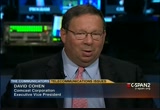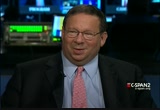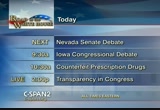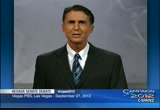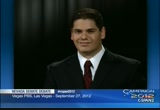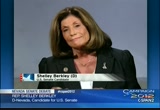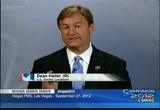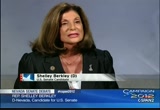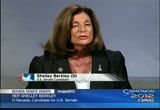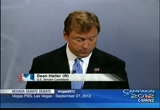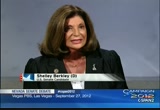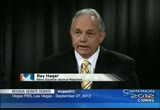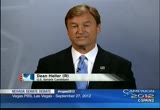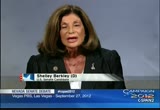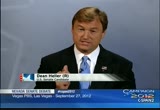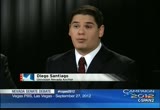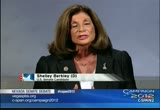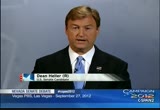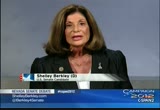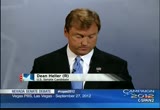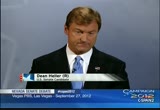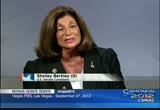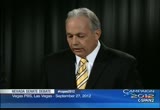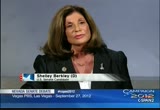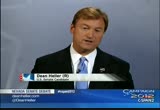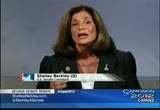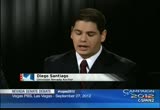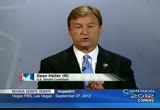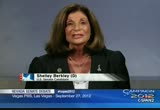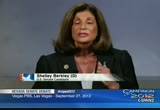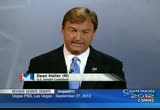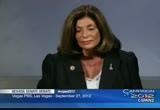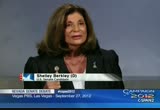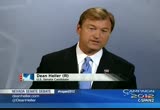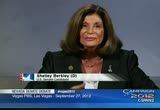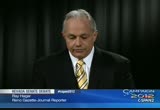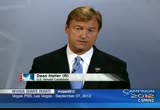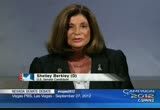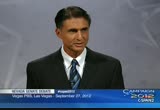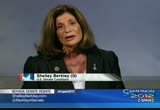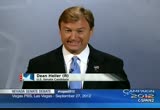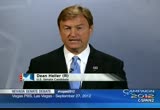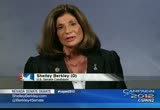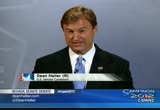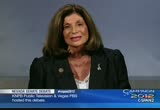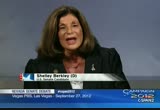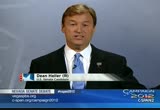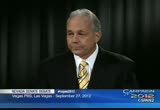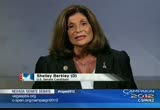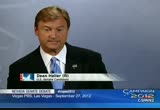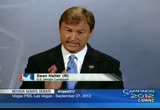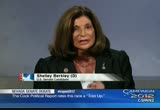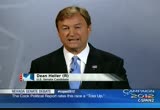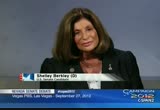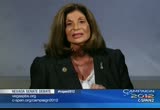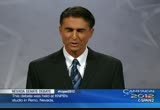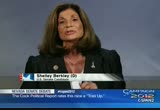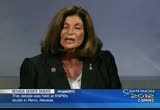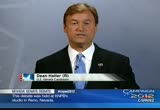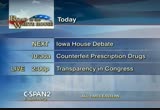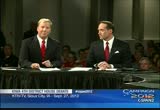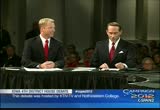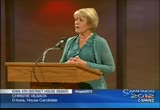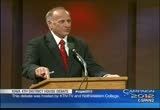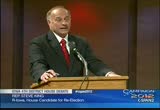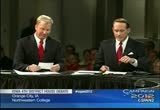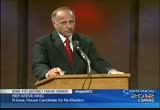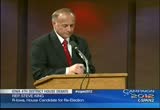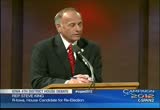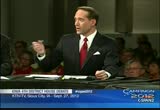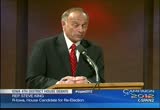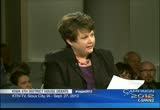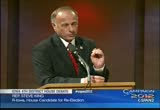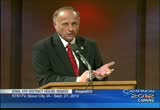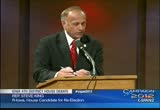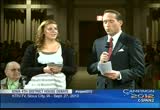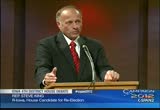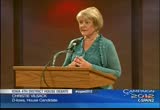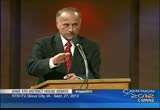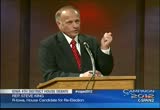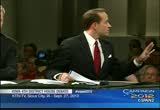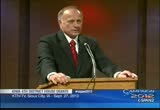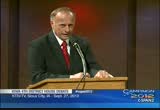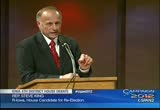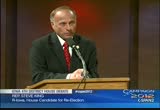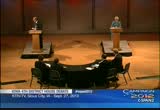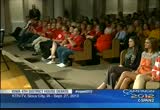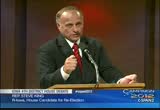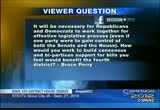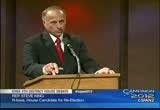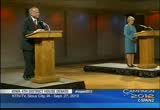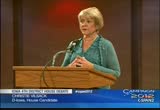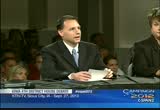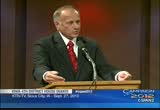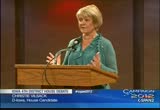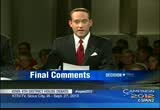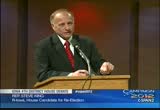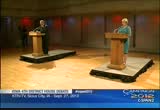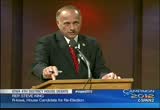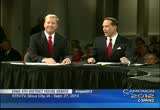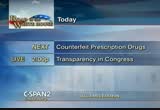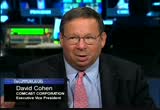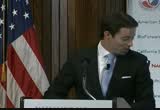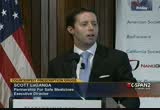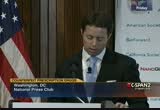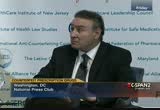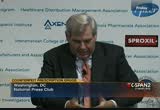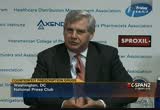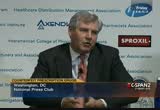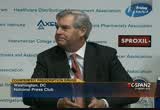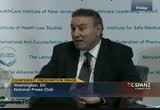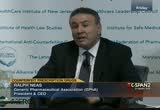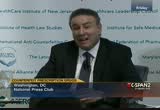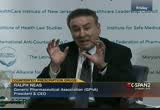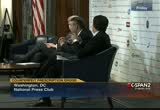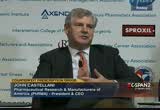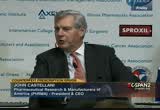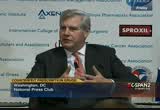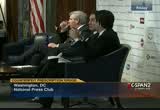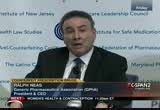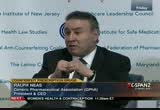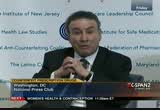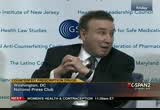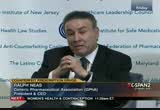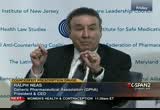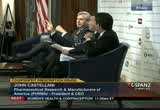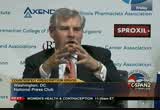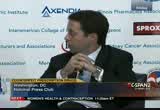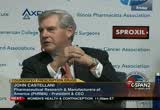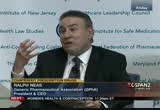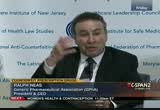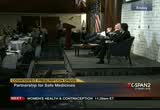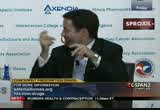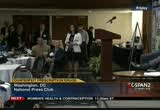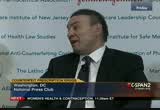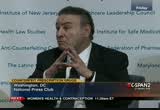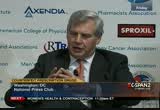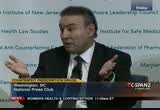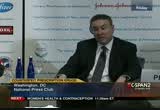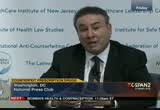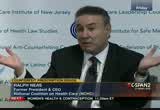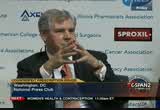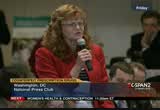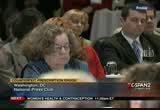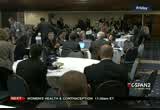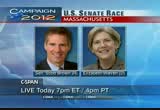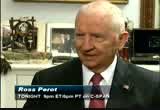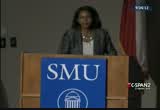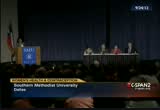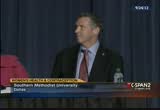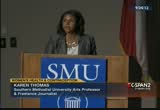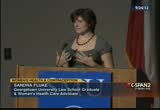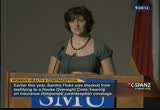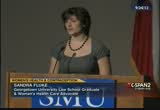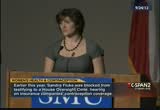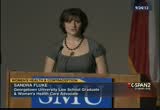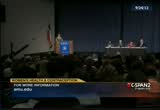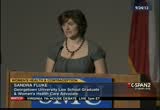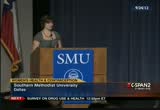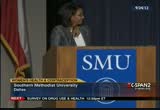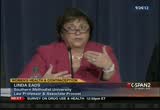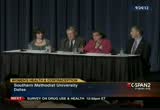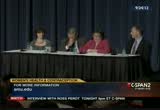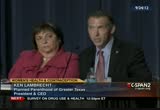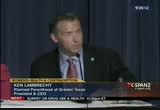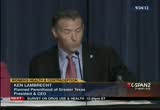tv U.S. Senate CSPAN October 1, 2012 8:30am-12:00pm EDT
8:30 am
communicators," i'm going to quote reid hastings again -- um, that with comcast, remember comcast doesn't have a bite cap anymore. we have a data usage threshold which, um, actually most of our markets we have nothing, no data usage threshold. we are trialing, um, some consumption-based billing arrangements with a data usage threshold that starts at 300 gigabytes of usage a month, and reid hastingses has said at those levels they would no impact on net flex flick anyway -- netflix anyway. it's not reflective of the careful negotiations that went on with the actual language of the internet order. >> host: and unfortunately, we're out of time. thank you both.
8:31 am
i hope it's quicker than three years before we get you back next time. david cohen, amy maclean, this is that iters. "the communicators." >> watch and engage with c-span's road to the white house coverage as the presidential candidates meet this wednesday for the first of three debates. just ahead, a nevada senate debate between incumbent republican senator dean heller and his democratic challenger, u.s. representative shelley berkeley. that's followed by a u.s. house debate with iowa gow congressman steve king and democrat christy vilsack. then two rivals in the pharmaceutical industry come together for a call in more cooperation in combating counterfeit prescription drugs. and live at 2 p.m. eastern, policy analysts on how congress has fared in making its proceedings more transparent to the public.
8:32 am
later today the carnegie endowment hosts a discussion on how the next u.s. president should engage the world. panelists will discuss topics including the international order and the rise of major world players such as china. the event begins at 6:30 p.m. eastern, and you can see it live on c-span3. now, a nevada senate debate between dean heller and shelley berkeley. they recently met for their first debate in what's being called one of the closest senate races in the country. the cook political report rates the contest a toss-up. this event comes courtesy of knpb-tv in nevada. >> good evening. republican u.s. senator dean heller and democratic congresswoman shelley berkeley will face off in an hourlong debate sponsored by vegas pbs,
8:33 am
knpb public television for northern nevada, reno public radio and the reno gazette journal. i'm rich fox, and can i'll serve as moderator. here is the format for the debate. each candidate will give a one minute opening statement. the candidates will then be asked a series of questions from a panel of three reporters. the candidates will each get a minute and a half to answer the same question. the candidate who receives the original question will get one minute to rebut. we will conclude the debate with two minute closing statements. opening and closing statements, in addition to the first question, have been determined by a coin toss. tonight's reporters are brent boynton, news director of knpb; ray hager, political reporter with the reno gazette journalty
8:34 am
diego santa yea go -- santiago with univision. shelley berkeley, you have the first opening statement. berkeley: thank you, i'd like to thank the sponsors for hosting our first debate and for the viewers who are listening tonight. thank you for tuning in. about 50 years ago i lived in a small town in upstate new york, and my father couldn't make a living, so he decided that he would move his family west for a better life. we drove across country, we were headed to california. we stopped in nevada for the day, we never left. my dad was a waiter. on a waiter's salary, he put a roof over our held, food on the table, clothes on our back and two daughters through college. not so bad on a waiter's salary. when i -- i'm the first person in my family to go to college, and i, um, worked my way through college as a waitress and a key know runner -- keno runner, a
8:35 am
cocktail waitress and a shoe shine girl. i think it's my job to make sure that people who come after me have the same opportunities that my family had -- >> moderator: thank you. and senator heller? heller: mitch, thank you and thanks to the panelists, and also thank you to my opponent for also being here tonight. thank you so much. i grew up, i grew up here in nevada with five brothers and sisters. people know -- most people know my family by now. my father was an auto mechanic, and my mother was a school cook. my father created his own business. hard work. government didn't help. but he had certain principles that he lived by, important principles. specifically, if you worked hard every day, if you worked hard every day, you'd get an opportunity to succeed. not a guarantee, but an opportunity. he also believed that if you played by the rules, you'd be rewarded, and if you didn't, there would be consequences.
8:36 am
it's amazing how much in this country has changed in the last four years. and the result, the results of this change that what my father went through isn't true today, it's amazing what the impact has had on our government, our economy and on jobs. >> moderator: our first question comes from brent boynton. >> >> you both have a pretty consistent record of voting along party lines, and we've certainly seen more than our fair share of negative commercials during this campaign. many nevada cans and americans as a whole have grown tired of the youing polarity in between -- the growing polarity in between the political parties and ideologies. are you willing to compromise party ideals for the benefit of the state and the nation? please give an example of a time you worked with members of the opposing party for the betterment of nevada. berkeley: thank you very much for that question. um, it is true that our
8:37 am
government has become more polarized over the last few years, but i think it's important to stand for your principles. the most important thing we can do right now for the state of nevada is get people back to work. i think the most important thing are jobs, jobs, jobs, and that's why i support big -- small businesses, make sure that they can rehire people and hire new people. that's why i think it's so important to make nevada the jobs energy capital of, of the united states. and that's why i think we need to do everything we can to bolster tourism because it's still the backbone of our economy. when it comes to issues that effect the state of nevada, our delegation has worked very, very well together. let me give you an example. yucca mountain. it doesn't matter what party you're in, what side of the aisle. the fact of the matter is that the nevada delegation stood fast when it came to protecting the people of the state of nevada from acquiring nuclear waste
8:38 am
from the rest of the country. i think that's one good example. when it comes to other things, i worked very closely and across the aisle with people every day when it comes to our support for israel, when we insure that the iranians don't acquire nuclear weapons, and i think i would work with anybody to make sure that we got our economy back on track, to get our budget under control and we end wasteful spending. >> moderator: okay, thank you. senator heller? heller: rick, thanks for the question. i appreciate the opportunity to talk about something i think is important to most voters in informed. the most important question i get is jobs and the economy. but the number two question they do ask us is specifically how are you going to start solving problems here in this country because i do think that both sides, we get people together, they're willing to work together because that's how we're going to solve problems here in this country. i have numbers of legislation that i've worked with both sides of the aisle. in fact, i have, in fact, pushed
8:39 am
back against my own party on issues like the balanced budget amendment, prescription drug programs, stem cell research, so i have a list of things that i'm willing to break from my own party because i think it's important for nevada and good for the american people. i have legislation with debbie wasserman schultz on women's issues, i had legislation with gabrielle giffords before her accident on securing the worlder, john lewis on excise tax when it comes to the telephones. so i have a long list, a long career and history of working with both sides of the aisle because i believe at the end of the day if we're going to solve the problems facing this nation, facing the state of nevada -- high unemployment, high foreclosures, businesses going bankrupt -- if you're going to solve those problems, republicans and democrats are going to have to come together to solve those problems. >> moderator: congressman berkeley, you have a minute. berkeley: i think it's important we do work together, and on many issues we co. do. one of the things i recall
8:40 am
working across party lines was for the elimination of the estate tax. i worked with mr. brady who sits on the ways and means committee with me. that's also crossing party lines and breaking with my own party to make sure that we do what i think is right for the american people. um, b one of the issues that's very important that we talk about a lot is jobs and making sure that we provide an environment where we can create good-paying jobs and keep them right here in the state of nevada. we've got work for small businesses, making sure that we pass the hire act which my opponent voted against, the small business jobs act which my opponent voted against, making sure we make nevada the clean energy jobs capital of the united states which my opponent voted against investment for renewable energy. >> moderator: thank you. our next question comes from ray hagar, and it's directed to senator heller. >> as you know, nevada's a leader in national unemployment,
8:41 am
and in 2010 during a speech in elko, you questioned the wisdom of extending unemployment benefits. you asked, quote: is the government now creating hobos, unquote? as nevada's unemployment crisis continues, are you calling nevada's unemployed hobos? [laughter] heller: or this is the most difficult part of an election, that's proving something you didn't do or something you didn't say. and in this case, this is something i did not do and something i did not say. i did not say that. what i do want to talk about is i did. i believe there ought to be a federal safety net. i believe that's critically important. it's part of the responsibility this federal government has. for those who have come across hard times, tough times in this economy, especially here in nevada. so under every circumstance i've had a opportunity to vote for the extension of unemployment benefits. the first question that was asked, what have you done to break if your party, i think that's critically important. because i do think the federal
8:42 am
government has responsibilities, and one of those is to make sure there's a safety net for people who have had tough times. believe me i've live inside a family that's had tough times. it's not easy. you need to understand that safety net needs to be there to get people back on their feet. diswhrm congresswoman berkeley? berkeley: the fact of the matter is that my opponent actually did call unemployed people hobos, and i think that puts him very much in line and in touch with what governor romney said about the 47% that he obviously doesn't care about. the fact of the matter is that my opponent doesn't seem to care very much about them either. he voted five times to give tax breaks to corporations that ship our jobs overseas. he voted nine times for big oil to continue their tax subsidies, he voted twice -- not once, but twice to end medicare by turning it over to private insurance companies. that's not providing a safety
8:43 am
net. that is creating a promise for the people of the state of nevada. they node to know who's fighting for him and who's fighting for the big guys. time and again whatever my opponent says -- and he talks a good game. rather than standing with middle income nevada cans who have lost their jobs through no fault of their own, my opponent has been voting with wall street, voting with corporations that ship our jobs overseas, voting with big oil instead of taking care of business at home. you want to create jobs? don't give tax subsidies to big oil. invest in nevada's renewable energy companies. he voted against investing, investing in nevada's companies that are going to create good-paying jobs right here in the state of nevada. that's what nevada's senator has to do. >> moderator: thank you. senator heller, you have a minute to rebut. [laughter] heller: she has so many talking points, one by one we can rebut
8:44 am
everything. >> she has said. he -- she has not helped the middle class. nobody, nobody has done more to hurt the middle class than my o opponent. think what she did for wall street as she says i'm supporting wall street. every time they come with their handouts, she actuallies them out. she's bailed out detroit, wall street, you name it, she's bailed out everybody time and time again. the question is, when are you going to bail out the middle class? you continue to support big bailouts. and also one other thing, she's raised more money out of new york city than has the city of reno. i have raised more none in this campaign in the city of reno than new york city. she's raised more money out of wall street than i have in this campaign. who's in the pockets of the big money in wall street? >> moderator: thank you very much. our next question comes from diego santiago who will direct it to congresswoman shelley berkeley. >> congresswoman berkeley, i was intrigued looking through both
8:45 am
of your web sites that both the candidates have the country of israel as one of your top issues. now i ask, why is this issue at the top of your agenda, and has enough been done to defend our only true ally in the middle east? berkeley: i pride myself on being a strong supporter of israel. in the united states congress on either side of the aisle, we share a common bond, and it's the only democracy in a very dangerous part of the world and one of our strongest allies in the world. i think we need to do everything we can to work with israel to insure that iran does not acquire nuclear weapons. it's not only an existential threat to israel, but it's a threat to the entire world, and it would unleash a massive arms race in the middle east that would be very destabilizing and dangerous in an already unstable part of the world. the relationship between the united states and israel has
8:46 am
been solid for the last 65 years, and it's important to have members in congress that know the difference between the gaza strip and the las vegas strip, particularly now when there are so many serious challenges in the middle east. there are problems we egypt, there are problems with syria, jordan is becoming destabilized, lebanon is controlled by hezbollah which is a terrorist organization. the fact of the matter is, we have to be very, very careful to insure that our ally, the most reliable ally that we have and the only democracy in a very dangerous part of the world, has the tools that they need in order to keep their people safe. ..
8:47 am
there is no furnace. what happened in egypt, what happened in libya it took them weeks to decide it was a terrorist attack. i'm concerned because israel needs our help. israel needs our support and i stand behind them. >> moderator: you have one minute. berkley: thank you very much. this is an issue very important to me. i have spent considerable time on middle east peace. the fact of the matter is what i disagreed with the president i was the first one on either side of the aisle to express my differences, and in no uncertain terms. but let me turn this around for a little bit and talk to you about things that we don't hear. this administration with my health trumped up the israeli military by $200 million this
8:48 am
year. we helped create and put up israel's iron dome which is the missile defense system. we did it collectively. and when israel was faced with the palestinians going to the united nations, and declaring, asking for unilateral declaration of statehood, there was one country, one country that stood with israel and stop that, and that was the united states of america with me talking to the president of the united states and the secretary of state making sure that did not happen. >> moderator: thank you. our next question comes from brent boynton it will directed to senator heller. >> those of us have heard of the drought come and different degrees of nevadans, just how devastating it can be to the stake him if it were listed as an endangered species. economist tells it would shut down a lot of our economic development. realistically, what can you do in the senate to prevent that from happening. heller: there's a lot we can do
8:49 am
on this particular issue. it's a huge issue. for someto grow. hunting and fishing in the state of nevada, i have a little bit of experience with it. 's stage growls isn't a big issue for the state of nevada. it could close to 11 western states. we're talking an impact it would have on cattlemen, agriculture, mining. it would be huge for the state the nevada. here's what i've done. i've put together working group are brought people together from both sides to talk about this specific issue, what we can do to keep it from getting lifted. here's what the problem is. we have too many fires. we are very poorly managing the planes. because of all these fires we are literally learning -- running the habitat. more can be done. we will be discussing this in washington, d.c. i discussed every day i'm back to. the last thing we need to do is the impact would have on my, the impact it would have on cattlemen. and, of course, the impact it
8:50 am
would have on agriculture. it would be devastating for the state of nevada. >> congresswoman berkley? berkley: i may not eat the sage grouse but i know we need to do in order to protect them. we have to do everything we can to ensure that these sage grouse are not listed as an endangered specie. it would have devastating consequences on a large part of our economy here in nevada. the miners, ranchers, and renewable energy companies that are locating their renewable energy equipment on federal property. so it's very important that we keep the habitat can we improve habitat, grow the habitat of the sage grouse of the state of nevada and other western states are not devastated economically by having the sage grouse listed as an endangered species. this is an area that we do work together and we should work together. the entire delegation coming together to do something that is good for the people of the state
8:51 am
of nevada by doing something good with the sage grouse in the state of nevada. >> here's my fear. this president get reelected people delist the sage grouse. i think you'll listed with the support of my opponent. think of the impact it would have on the environment, the ability to create jobs here in nevada. let's always go back to the jobs and the ability to create jobs in america. i believe the sage grouse gets listed. i do. you need a senator that will fight back and realize and understand that talk to this administration and say if you reelect a we're in trouble. it will be a big, big concern. spent our next question comes from -- >> congresswoman berkley, in 2008 you wrote a letter to representative peter stark who chaired the house subcommittee over medicare, urging them to oppose lowering medicare rates
8:52 am
for dialysis. why in a letter did you not point out that your husband is a kidney specialist which could be a potential conflict of interest? berkley: my one and only concern was to protect the health and well being of the people of the state of nevada. that is my job. now, i wrote a letter to pete stark, but i sit on the same committee with them and i've known him for six years. he knows exactly what my husband did, does. let me tell you something. i know my opponent has attacked me on these issues. i can take these attacks, but what i can't ignore the attacks on people of the state of nevada. while i'm voting to create good paying jobs and working to create good paying jobs right here in the state of nevada, my opponent is voting for big oil companies. nine times giving tax breaks to big oil companies, voting five
8:53 am
times to give tax breaks to corporations that are shipping our jobs overseas. while i'm working very, very hard to make sure that we get people back to work, make sure we keep people in their homes, to make sure that we protect older americans, make sure we protect their social security and medicare. standing with her veterans. my opponent is fighting for the big guys, the guys who don't need his help, at a time that nevadans get a champion in the united states senate to make sure that their needs are protected. my opponent is playing for the other team. and while he wants to throw this off and make it sound, make it into something it isn't, the fact of the matter is i know who i am fighting for in this state, and i know that my opponent isn't. >> thank you. heller: character matters. let me repeat that. character matters in your life, and matters in the united states and. my opponent has a problem. she has a big problem. do you how unusual it is for the ethics committee and the house
8:54 am
with five or public is invited democrats to move forward on an investigation like this? its big. it's huge. she can't get away from it. this is a pattern. this isn't a problem she's had since you've been in congress for the last 14 years. this is a problem she had prior to getting to congress. is all well documented. the bottom line is she keeps argument jobs going overseas. this is what's happening when you don't build the pipeline. the keystone pipeline that she voted against, where is all that oil going to go? is going to go to china to great those jobs. she can talk all she wants about getting jobs for the middle class. when she voted for obamacare, who is creating jobs for the big people in poor countries? it's a shame we have to walk down this road. tragedy i think character does matter, and you know what's important to the people of the state of nevada? who is going to protect them? who's going to be fighting for them in the united states senate, the middle income families can who is working for them? who's making sure we get people
8:55 am
to go back to work developing our food, energy, clean energy. the sun, wind, geothermal and the state of nevada. we need to harness it and get people back to work. we need to take care of our small businesses, give them the tools they need to expand and hire. my opponent voted against the higher act which put people back to work. he voted against the small business jobs active even our republican governor in the state of nevada thought would be a very important piece of legislation. i supported it because i want to create jobs here in the state of nevada. i'm in favor of the keystone pipeline. i think we should build it but i want to have an ironclad guarantee that the oil that goes through the pipeline stays here in the united states to lower our energy prices. my opponent had and the men that he could have voted for. he voted against it and that oil will be shipped to china. term thank you. our next question comes from diego santiago who was directed to senator heller.
8:56 am
>> in a spanish-language ad, congresswoman berkley accuses you of wanting to go back to the -- [inaudible] this is in regard to the dream act. in 2010, he voted against this bill. i ask you, senator, what exactly is the problem with allowing documents students -- [inaudible] to change their legal status? heller: thank you, diego. this is something that can't be solved in washington, d.c. it will take the republicans and impressed together in order to make this happen. the d.r.e.a.m. act isn't going to pass and the recent the dream act will not not pass is because the majority party keeps putting it on for without amendments or discussion. if you think you're going to be so passive legislation, i don't care if you're republican or democrat, and put the thing on the floor and restrict discussion and strict amendments it's simply not going to does. there are things we agree on. i argue we agree on 80%. of what we need to do immigration and before the i support immigration reform.
8:57 am
marco rubio was here in town a couple ago. he and i've had this discussion. let's to put together an immigration reform that works for america. we shouldn't have to pay thousands of dollars in order to immigrate to this country. he shouldn't have to hire a lawyer to immigrate to this country. it shouldn't take you years to have to immigrate to this country. we agree on a lot of things but to open the discussion, let's not keep throwing a bill on the floor and say go for it, and let's work together. all we are arguing over is the last 20%. if you serve in military, yes, you should have the right to immigrate. same thing for education but we can keep it in this country but you still have to go through the process. there's a way of solving this. they key is for republicans and democrats to work together. berkley: there is a way to solve all of these challenges.
8:58 am
and my opponent does a good game, the fact of the matter is that he doesn't track is right. is opposed to comprehension immigration reform. he's in favor of the arizona law that most was declared unconstitutional by the united states senate -- by the united states supreme court. my opponent thought the arizona law was so good he wanted to bring a tear to nevada, but the one thing, the one thing that i can't believe he is opposed is the d.r.e.a.m. act. and he voted against it. not 80%, not 20%. he voted against 100% of the. what does the d.r.e.a.m. act said? it says if you're a youngster that has come to the united states through no fault of your own and you're in college or you volunteer for our military, you should have a pass to legal status. it couldn't be any more simple than that, and my opponent voted against it and the also come he's on record saying if he remains into united states senate he's going to vote against it again. the latino families in the state
8:59 am
and in this country deserve to have that dream act passed. deserve comprehension immigration reform, you crack down on employers that knowingly hire undocumented workers, and then you give people an opportunity to get to the back of the line and have some sort of legal status when they get to the front. and the old arizona law which is paper, please, that's a terrible discriminatory law. my opponent wants to bring it to nevada. heller: i say we agree and 80% of clinically the 20% we didn't agree. amnesty. that's what she supports at the end of the day. if you put a blanket amnesty down on the floor of the house of representatives, she would support. let's step back for just a moment. people come in -- the hispanic so, to my office, they are concerned about the dream act and the concerned about other things. they're concerned about their families, jobs. they're concerned about the education for the kids. these are the issues we have to
9:00 am
solve unsolved for the hispanic community. they are unemployment again is half a percent higher. we have to put together jobs and programs that have to work every time. every time i posted she would vote for the jobsite, the unemployment has gotten higher. higher in this state. that has to change. i remember when she was jumping around saying the stimulus would create jobs in nevada. we were losing 65,000 jobs in nevada. every time she talks of job growth, an opponent goes higher than what our next question comes from brent boynton who will direct you to congresswoman shelley berkley. >> one of the biggest issues we face on the federal level is our overwhelming federal debt. it's gone building just domestic problem that will affect future generations. it's become a national security issue and a foreign policy issue. what specific steps do you propose the united states take to get out of debt or at least
9:01 am
make our interest payment issue to live with? berkley: all right, look, we have to get our debt under control, and wasteful spending. and this is the way we do it. the first thing we do is stop giving tax breaks to corporations that are shipping our jobs overseas. my opponent voted five times for the. we've got to stop giving big oil tax subsidy. they don't need. the big guys don't need. people of the state of nevada need to help, the wall street, not wall street corporations. and then after we do that we can make nevada and this country for clean energy jobs capital of the world so we can be generating good paying jobs. you want to get down our debt? let's get people back to work so they're paying taxes. and another thing we can do when it comes to our debt is to pass a balanced budget amendment. and let me tell you what that does. i want to pass a balanced budget amendment but i'm not going to pass an amendment, i'm not going to vote for a balanced budget like the ryan budget that my
9:02 am
opponent voted for, not once but twice, which into medicare and turns it over to private insurance companies. let's make sure that what my opponent is voting for the big guys, voting for corporations to shift of jobs overseas, voting to give big oil more tax breaks, let's take care of the people here at home, make sure that we're not balancing the budget on the backs of our seniors, the backs of her veterans, and make sure that we get our budget under control by ending wasteful spending and working together. >> moderator: senator heller? heller: my opponent doesn't care about balancing the budget. she doesn't care about the debt either. she's had 14 years to talk about it. this is the first time i've ever heard her say that she doesn't like the $16 trillion in debt we have had. [inaudible] the day we've had another trillion dollars for the third year in a row. sunday is the day. imagine it. let's break it down two jobs.
9:03 am
that's 20 million jobs at $50,000 apiece. and yet i would rather take that debt, bringing together can solve the problems we have here in this country. here's the problem. our revenues are 13% of gdp. out expenditures are 22%. that gap is $1.5 trillion. we have to bring that together to about 18%. bring that legislation to floor. let's have the argument to we can't get the majority leader to bring that to the floor. our amendment, allow discussion can we can solve this problem if both sides can work together. >> moderator: congresswoman berkley? berkley: my opponent speaks a good game but the fact of the matter is i've been working to bring down this deficit for years, and it's very important that we do this for the very reason that was just said about national security. but let's examine the facts. my number one, two and three binaries are creating jobs in the state of nevada. we hope small businesses.
9:04 am
we make nevada the energy jobs capital of the united states. we create good paying jobs right here in the state of nevada. help our tourism, our tourism industry create good paying jobs, but my opponent doesn't get anything from the income families and it doesn't do anything to get people back to work. while i'm putting day and night to make sure that we get good paying jobs that we keep people in their homes, that we protect medicare and social security, and we stand with our veterans. my opponent is voting for budget after budget that takes away, that balances our budget on the backs of our senior citizens and our veterans turn for the next question is from ray hagar. spent senator heller, and 2011 he voted twice for republican budget plan that would've changed the medicare program. could you explain your plan for medicare for both under 55?
9:05 am
because those are the people who would be impacted by these changes. heller: i have said this story several times. that's 79, turned 79 on sunday, and both my mother and father rely on social security and medicare. and my father's case, veterans benefit. my fathers had heart surgery, back surgery, stomach surgery. he wouldn't be celebrating his 79th birthday on saturday if it were not for veterans benefits and also medicare. and i made a promise when i first came to congress to my parents and to every senior who is a citizen in nevada that i would not do anything that would change her social security or the medicare benefits. and i felt true. i felt true to that promise. and i continue to do so as long as i am in washington, d.c. we have to take a look at medicare. the biggest from with medicare today is my opponent keeps -- [inaudible].
9:06 am
she took a trillion dollars out of medicare over the last five years, 700 billion just to give it to obamnicare. we need to create jobs here in this country. we have 12% unemployment here in the state, 8% across the country. my opponent keeps saying jobs, jobs, jobs. every time she was good jobs bill unemployment goes higher. don't believe it. simply don't believe. that's not the way it works. wall street gumshoes helping wall street. she's helping big oil. she's helping the big banks, detroit. berkley: look, my opponent voted not once but twice for the ryan budget that ends medicare by turning it over to private insurance companies. and this is what's going to happen, experts said this was going to happen. it's going to increase the cost of medical care for older americans by $6400 a year.
9:07 am
prescription medication, the cost is going to skyrocket. as bad as that is, it's going to put private insurance companies bureaucrats in between doctors and their patients. it's a bad idea. he said he was proud to do it. as far as the light of you, let me tell you what the light of the year is. my opponent knows perfectly well that i did not take money, cut money out of medicare, guaranteed benefits. we voted to eliminate overpayments to insurance companies. voted to eliminate overpayments to insurance companies and we extended the life of medicare i-9 years. that's a pretty good too. now, my opponent can't be too upset about those because he voted for that exact same so-called cut in the ryan budget. it was not in the right budget, he didn't vote once for that, he voted for twice what can't be that bad, that cut, because that so-called cut because he voted for the same thing. it takes a lot of brass, and let
9:08 am
me quote president clinton, it takes an awful lot of breast to so much accuse me of doing something they have done twice. >> moderator: senator heller? heller: i never heard so and give an answer what they said they didn't do it and then said they did in the same spell. the of the year, continue to tell the light of your even with confidence. is still the light of the year. she talks about the ryan budget. she talks to bring it to the fore. all it wants is -- and when are the ryan budget was going to pass. what we need is a democrat budget. we couldn't get a democrat budget out of the united states center. we couldn't get the majority leader to have a budget hearing. couldn't happen. i don't feel like have to explain this to my own opponent. bunch of republican budget, a democrat budget and you bring them together and you solve the issues. that's my goal. i want solutions. but you can have solutions if one side is not going to talk. >> moderator: thank you.
9:09 am
diego has the next question. he will attest to congresswoman congresswoman shelley berkley. >> in january 2007, the talk of the nation in regard to -- [inaudible]. berkley: thank you for the question. look, nobody knows better than i the importance of homeownership. i remember very well when my father, was a waiter, other than the times he grew up -- i think status moment is when he was able to afford a house for us. we put down roots in a community. it made us feel important and that we are valley. homeownership is for importing. there's nobody in the united states congress has done more to keep people in their homes that i have. because i understand the importance of it, but i think we should be doing is allowing the principal write-down.
9:10 am
too many of our families are in foreclosure. they can't afford their mortgages. they are underwater, and by doing a principal write-down, they can afford their homes so they can stay in their homes. i'm also in favor of mortgage modification. give these people the opportunity to be able to pay a mortgage, may not be what the original mortgage was, but their homes are almost worth, in some cases almost half the value of what they paid for it. give these people an opportunity to to stay in the homes, keep their neighborhoods all, keep the houses from becoming dilapidated and lower the property values of the rest of the neighborhood. homeownership is important. and making sure that we keep our fellow citizens in their homes is very important as well. and holding the wall street banks accountable for having gotten us in the mess in the first place. that is a very important thing to do as well. heller: my opponent, i need to explain how flipping homes help
9:11 am
the middle-class but i'll take this, she start this process in 1999 when she voted to repeal the glass-steagall act. when she repeal. that the regulation of the industry, they wanted to. they came to her again. then they said we don't want the glass-steagall act anymore and now it's the beginning of the end of the housing crisis. i introduced legislation. this is the purpose of my legislation to i want people to stay in their homes. i want that data comes to stay and hope it is called the home act. if you face foreclosure, the worst-case scenario i want you to stay in your home. i want you to stay in your home for five or six years. when your credit where they can you the opportunity to buy that house back. buy it back for whatever the current prices but you can lease the home and invite back. it keeps families and those. it also keeps children in their schools and it keeps the
9:12 am
neighborhood from deteriorating. these are the kind of ideas we need in washington, d.c. these are the kinds solutions we need in washington, d.c. >> moderator: thank you. thank you, thank you. now has worked harder than i have in order to keep her constituents in their homes. the are a number of things that we have done and we can do. my opponent voted against every one of them. it's amazing in an election how all of a sudden he had a rash of pieces of legislation that are supposed of the people of nevada when he is never help the people of nevada before. it's very important to ensure that we never get in this mess again. i voted for sensible wall street reform to hold the wall street banks accountable, that their greed has gotten us into this problem where our fellow citizens, our middle income families have lost their homes, lost their jobs, and while my opponent is busy supporting wall street to. now, i supported the wall street
9:13 am
reform act because i want to hold these people accountable for what they did to this country. at my opponent voted against it. peacpeace to stay with the big s against people that are in foreclosure. instead of protecting the people of the state and nevada, keep working on wall street. >> moderator: this question were directed to senator heller. >> what is the best role as a producer of renewable energy and its technology? and to what extent should the federal government subsidize these endeavors? heller: first of all, thank you for the question, first of all i think the federal government should be involved and that's why i supported some of the tax funds and the ability for them to put the tax credits what they needed to move forward. i believe we ought to be concentrating here in america. the difference between myself and my put them she thinks about it come from the middle east. the first time i've of her actions they that she is now supporting the pipeline. nevada has an opportunity to
9:14 am
that that has a real opportunity for renewable energy. geothermal in the north, we have the most geothermal plant and opportunity and potential in northern nevada than anywhere else in the country. the same with solar, in las vegas. some of the most intense solar when we have in the country. we ought to be taking advantage of the. i voted against my party for the renewable standard because i think it's critically important that you have rules set so we can move forward on these particular issues. it includes renewable, [inaudible] americans to get back to work. a devastating impact my opponent's voting record has, voting down, inability to go after our own natural resources in this country. it will create tens of thousands of jobs. if we had an energy policy in this country. berkley: thank you.
9:15 am
look, we need a good energy policy in this country, and this is what the energy policy has to do. it has to lower energy costs here in the united states. it needs to reduce our dependence on foreign oil and it needs to develop our renewable energy sources. nevada could be the epicenter of renewable, clean energy, job creation. and we can create a product that we need can energy. now, my opponent, despite what he said, he voted to slash investments in renewable energy companies while he voted nine times to give tax breaks to big oil companies. now, i know that this state has an abundance of sun and wind and geothermal, we need to harness this energy. put people back to work, good paying jobs in a state of nevada they can't be shipped overseas. might opponent keeps voting with big oil. how are we ever going to get beyond big oil and our dependence on big oil and develop the energy sources that we have right here in the state of nevada where we can put
9:16 am
nevadans back to work. that's who i'm fighting for. that's who i'm standing up for. might opponent is standing with big oil. still making sure that we'll take care of the big guys instead of the people here in the state of nevada. and as far as the keystone pipeline, let's build the thing but let's make sure that the oil that is going through that pipeline stays here in nevada to lower our energy costs and isn't put on a tanker and sent over to china to lower their energy costs. try to senator heller? heller: it's amazing how might a pointless to deny certain industry. all these dirty profits she's talking to congressman one person in this room who is invested in big oil, invested millions of dollars into big oil, and that's my upload. that meets a what i'm going to do to create 1 million jobs next year here in this country. one of the things wedded to bestow every every american, hard-working american your taxes are not going a. we do not want to raise your taxes. my opponent voted for the fiscal
9:17 am
cliff. she says she's against it but she voted for the fiscal cliff at the end of the year. let's go after our own energy, natural energy. let's go after this pipeline. we can do a lot. 10,000 jobs directly with this pipeline and 100,000 director. there's a lot of things we can do but we also have to repeal this new health care bill. 21 new taxes, killing the middle class. killing and i hope we get a chance to talk more about that. >> moderator: we have time for another question. it will come from ray hagar and he will direct it to congresswoman shelley berkley. >> congresswoman buerkle, both of your stood tall for veterans or in this campaign that many veterans are concerned about looming defense cuts, and if they come, how do you make sure that nevada's air force base and the air station and the hawthorne army ammo to go which are economic engines stay viable
9:18 am
for nevadans? berkley: the, every generation our nation calls upon men and women to go and on the uniform and fight for us. a sacrifice, a great you. they risk their lives. a comeback. we need to make sure that we provide these veterans with benefits that we promised them. that's why i was so proud to be able to help, to build the va hospital, the brand-new va hospital down in nevada. to take care of veterans throughout the state. and that's why i passed a just and daily bill where justin davies parents help so we can provide the resources for people that are coming back from the field of battle with ptsd problems and emotional problems. now, when my opponent had a chance to stand with veterans and fight for them, or fight for big oil, he chose to fight for
9:19 am
big oil and give them tax breaks instead of making sure that we protected the homeless veterans. there was a homeless veterans vouching program that might opponent voted to get an end so he could continue giving tax breaks to big oil corporations and ship our jobs overseas. we have a lot to be very proud of when it comes to our support for our veterans but we need to make sure that we take care of them and we monitor the promises that we have made through our veterans in this country. >> excuse me, i might've missed but i didn't hear your plans on saving the air force base and the air station and hawthorne army ammo when these cuts to come. berkley, i'm going to do that in my second minute, but i thought it was important since you brought up veterans that we talk about our veterans and we give them the honor that they deserve. heller: i'm convinced that might
9:20 am
opponent tomato is that it's not a lie if i can convince the masses to believe. my legislation on the women's -- that is homeless act just passed during the last session. that would help homeless veterans women and allow them, with her children, to get the support they need. let me tell you what my opponent is not telling you. she voted for sequestration. she voted to cut these budgets, the very issues were talking about. putting them at risk. she voted for. and yeah, she sanctions against -- i love out of practicality works. sequestration also cuts try get it she talks about the promises we get to veterans. my father is a better and my brother is a better. that promise to get to veterans get sequestration cuts, increases brings, reduces benefits. my opponent says one thing and she does another. and also cuts medicare. this is what sequestration does.
9:21 am
and by the way, secretary panetta says it's a bad piece of legislation. and i agree. it is a bad piece of legislation. that's why i voted against it. track to sequestration will never happen because it will have catastrophic consequences on the economy of this nation, and i'm willing to sit and work with anybody to get our budget under control and stop wasteful spending. but i will say this and i will answer raised question now. i have spent the last 14 years making sure that that they get the resources they need, not only because it creates good paying jobs that it's important for the national defense. and the state of nevada has, place second fiddle to no one when it comes to our national defense, making sure that our young men and women, when they go and they fight for this country, that they are able to have the best equipment and the best resources that this nation can give them. so i'm not worried about that
9:22 am
because we're going to ensure that they are well protected and that their budgets will stay intact. >> moderator: thank you. diego santiago has the next question. >> avec the fifth largest of its kind in the nation with more than 300,000 students. nevada has one of the worst academic test scores among students in the country. what do you propose should be done in order to better the education system? tractor i think that's a critical important question, especially for our economy here in nevada. i just want to .1 thing in the last question. you vote for sequestration and she says that won't happen. should vote for the fiscal cliff, now she says it's not going to happen. can you imagine that kind of -- this is the problem that i see. we have the department education back in washington, d.c. they have 3500 employees back to
9:23 am
the make over $100,000 a year. the arctic dating, dictating the clark county school district have to do their job. i don't think that's a shame. i think it's wrong. i'm not talking applause and down the department of education, and i've never said that i know i never will say that. but can we reduce the size of the department of education and get the money down to the clark any school district lacks i believe that the best education for children in nevada comes between parents, teachers, and principles. those of you should be making decisions for the children. not some bureaucrat back in washington, d.c. berkley: if i can put the, my opponent mention my book vote on sequestration but just a few questions ago answers ago, he said that he voted to kill or to end medicare by turning it over to private insurance compass, not once, but as. he say to stop and he said he doesn't need. it was never go to passingly. so all right. look, i understand the
9:24 am
importance of a good education. i in the first person to my family to go to college. my dad in ninth grade education to a good education changes your life. our students are not competing anymore, just to be with kids from want and in in new york and other states. they are compete with chinese and indians and other emerging economies across the planet. we've got to invest in ourselves. i was astonished knowing the importance of a quality education when my opponent slashed to -- voted to slash progress. he voted to increase the interest payments on student loans. that's how i went to school. that's a thousands and thousands of nevada's, middle income families depend on this. my opponent voted to double. as far as the department of education is concerned, walk you back to the answer, the lincoln county dinner, he very clear he said that's exactly what he would do, eliminate the department of education.
9:25 am
it was picked up by the times. heller: is not accurate but that's fine. i'm not surprised that you would continue with the discussion. my opponent in 2010 voted against the education loan program. there are generations of american how did they -- how many generations of americans get their education. [inaudible] she understands the importance of parents, teachers and principals working for the better education of their students. not come from washington, d.c. this is what you get a gig at 3500 bureaucrats sitting on the company figured to dictate what they ought to be teaching our children. let's take those billions but let's take those billions and give it to the state of nevada. i have more confidence, far more confidence in governor sandoval added to the bureaucrats in washington, d.c. >> moderator: it's time for the candidates to make their closing statements.
9:26 am
congresswoman shelley berkley, you're of the first. berkley: thank you. when i first came to nevada as a child, i knew that this was the place for me to be. my family made a life ourselves in the state, and i think it's very important for me to make sure that those who come behind me, generations to come, have the same opportunity that my family had when we first came to nevada. this election is about the following, people come over to me all the time. they say congresswoman, i never missed a day of work, i never missed a mortgage payment, i lost my job, i lost my home, what am i going to do?
9:27 am
the attitude discretion is what this election is all about, who will fight for middle income of congress who will stick up for the people of the state of nevada? in a table of the state of nevada need a champion to make sure that we concentrate on creating good paying jobs here in the state of nevada, to keep people in their homes, that we protect older americans from ending their medicare by turning it over to private insurance companies and privatizing social security, some of the -- some who stand with our veterans to make sure they get the veterans attend benefits they deserve. he is taking care of the big guys at the big guys don't need our help. wall street corporations, corporations that ship our jobs overseas, big oil companies, they are doing fine. the people in the state of nevada need a chance again. and at a time to need a champion my opponent was championing the wealthiest among us. i think the people of the state of nevada now, just by listening to the two of us, who is in the corner, who fights for them every day. i'm asking for your vote, so i
9:28 am
can continue to help the people of the state of nevada transport thank you. senator heller. heller: i appreciate the university or taking time, knpb. those on the panel and/or so for allowing us to have this debate today. i think it's been very informative. tomorrow morning, tomorrow morning, american men will not go to work. we have a million less women working today than four years ago. for every job, for every new job that is created in this country, for authenticity. drive around the state and nevada. i see far more going out of business sales than they see new business. it's like driving through a snowstorm. the speed limit may say you can go 65, 70, but everyone is trying driving at 15, 20 because they are afraid of the next crash. that's where american families are today. that's where americans families businesses are today.
9:29 am
they have come to screeching halt because of the economic policies of my opponent and they can't create jobs. it's like a big wet blanket on economic growth here in this country. the good news is it can change. it can change. we can take this country down the right road and i said before, 1980 when ronald reagan became president, he created 50 million jobs in his first term. great economic policy. i hope we can do that again. i need your help and your support. i believe we can turn this country. i think we can turn nevada around. this is what's going to happen and i'm sure proud to be deny states center. i need your help and your vote for november 6. thank you. >> moderator: that concludes tonight's debate. i would like to thank the candidates, representative shelley berkley and center dean heller for participating in tonight's debate. and i'd like to thank you for joining us. goodnight.
9:30 am
>> this wednesday president obama and republican presidential candidate mitt romney meet at the university of denver for the first of three debates. watch and engage with c-span spoke to the white house coverage. >> up next we'll bring you another debate with the candidates vying to represent iowa's new fourth congressional district. then rivals in the pharmaceutical industry called for more cooperation in combating counterfeit prescription drugs. and later, live coverage with congressional watchers on congress' record in making its proceedings more open and transparent to the public. >> also today, journalists and communication analysts share their guidance on how best to watch the upcoming presidential debates. they will offer what's called a citizens guide for viewing and understanding the debates that begin later this week. posted by the national communication association, the forum begins at 1 p.m. eastern on c-span. >> when nation's cheat and trade
9:31 am
as china's cheat, i will find do something the president has not been willing to do which is called in on the carpet for it and label them a currency manipulator. >> we are brought more -- against china and one from the previous administration did in two. and by the way, we've been winning those cases. >> president obama and mitt romney meet in the first presidential debate, the news hours jim lehrer potteries from the university of denver. watch engage with c-span with our live debate preeta at 7 p.m. eastern followed by two ways to watch the debate at nine. on c-span both candidates on screen the entire debate, and on c-span2, a multi-camera version of the debate. and following your reaction, calls, e-mails and tweets. all our live coverage on c-span, c-span radio and online at c-span.org. >> now a debate between republican congressman steve king, and his democratic challenger christie vilsack. they are running to represent
9:32 am
iowa's new fourth congressional district. christie vilsack is the wife of former iowa governor and current agriculture secretary tom vilsack. the debate was recently held at northwestern college, christ chapel, in orange city. and it comes to you courtesy of ktiv-tv of sioux city. is a little under an hour. >> now here is the moderator, of the ktiv news for. >> and good evening, everyone. welcome to christ chapel on the campus of northwestern college here in orange city, iowa, were the fourth district congressional debate between republican steve king and democrats critical site. on matt breen from -- to broadcast this debate to two-thirds of the state of iowa.
9:33 am
spent i'm tom overlie from kd pc tv in rochester, minnesota, serving mason city and much of northeast iowa. we are joined on the panel tonight i ann minnick, chair of the masking occasions department here at northwestern college. spent also on a panel tonight, dan breen, no relation, staff writer from the northwest iowa review. that tonight we hope there a question. those from northwestern college students, our readers and viewers will help you make an informed choice on november 6. transport let's start by meeting the candidates for the fourth district congressional seat. steve king is a five term congressman has represented iowa's fifth congressional district since 2002. christie vilsack is a former first lady of iowa who serve as president of the vilsack foundation which partner with the national center for family literacy to promote media literacy with parents and their kids. now that you have a a chance to
9:34 am
meet the candidates it's time to hear from them. each candidate will get 90 seconds before the opening statements. before the debate we flipped a coin to see who goes first. and tonight, that honor goes to christie vilsack. vilsack: thank you so much. thanks to ktiv and thanks to northwestern for having us here, and thank you to my husband, tom, for coming. i thank god everyday that i have been by my site. you know i'm running for congress for one reason, and that's to make sure that people can continue to live in small towns in this district, towns much like the one that we are sitting in right now. i have a plan to rebuild the middle class, small towns across this district, and they're based on three things. based on innovation, education, and connection. i want to make sure we build the workforce without really strong educational facilities and our strong educational programs. i want to make sure that we build on what we've already done in innovation with renewable
9:35 am
fuels and wind. and want to make sure that we build the connection that we need, that we finish highway 20, but we build short rail, that we make sure that we connect every town and every college, every community in this state with high speed internet and broadband. my dad always said if the farmers are doing well we are all doing well, and that's just as true today as it was when he was saying that back in the 1950s. so today i want to dedicate this to the farmers of this district, especially the young farmers. i've been talking to a lot of them recently, and to our young farmers who worry about the farm bill because they no longer will have opportunities for young farmer programs. they are ffa leaders are worried about their pell grants, the article firms are worried about conservation. transport sorry, time. congress in cannes, 90 seconds for your opening statement thank you, thank you, matt. i think northwestern college for
9:36 am
hosting this but this is a place i really wanted to come for a debate. and i appreciate the atmosphere here for just a conversation so it's a lot of intensity on this conversation. we have built our lives here in this fourth edition. there or for generations of teens that live in this district. and we were married 40 years ago. we have three grown sons. they're all entrepreneurs and on record right but they all live within 10 miles of our house. and our roots go deep. they've only known one father, one mother, one church from one house, one school. and our grandchildren and our sons and daughters, daughter in laws can all go to church together and come back to her home and there's a great big lunch in the spill it on the deck and fight over the rope swing. when megan has to set the timer in order that they don't fight over the rope swing, i know life is as good as it can get. i started the business in 1975. that has been the foundation for me. i've represented all 32 counties here in western iowa for 10
9:37 am
years. when i was nominated i said then, i will go to all 286 towns in the 32 counties all the way to missouri. i did come and under to tell you tonight, i've got to all 382 towns in the 39 counties in the fourth congressional district. i live here but my roots are here. they're going to stay here whatever -- whatever happens in november. [applause] >> moderator: thank you, congressman king. now for the questions from our panel. each candidate has one minute to answer the question. each candidate will then get 30 seconds of rebuttal time. as moderate i the option to ask a follow-up question am i moaned, and indicates each candidate gets 30 seconds a piece to answer my follow. will also be taking questions on twitter so if you do tweet, please do. will try to ask those on the air tonight. so as you watch this debate, log onto twitter. what we ask you to do is use the handle ktiv in election, all one would. the first question in tonight
9:38 am
fourth district congressional debate comes from a colleague, tom overlie from kttc to congressman steve king, first. >> our national debt topped $16 trillion earlier in the month. for years we've heard candidates campaign on platforms i've reducing the national debt, only to see little action in washington, d.c. if you are elected, what would you do to help reduce our debt? king: i will continue down the path that i have been on. and i have long pushed to bring a balanced budget to the floor of the house of representatives and talked several years to get that done. i'm pushing very hard and i'm asking mitt romney to call for a mandate from the american people to pass a balanced budget and out of the house and senate but it takes a bully pulpit of the presidency to get this done. it's not going to be accomplished either way with the configuration we had in there today. unitas and constitutional fiscal conservatives to congress to join me, my votes are clear. there are 10 votes out there
9:39 am
simply that saved a $17.4 trillion had my colleagues followed that lead. we not only of a balanced budget, but we also have eliminated our national debt. it takes that kind of conviction to tighten things down. my record shows that the continue down that path. thank you. >> moderator: christie vilsack and if you're elected what would you do to reduce our national debt? vilsack: i think it depends on balance. we need targeted cuts. we need targeted spending and we need to ask people to make a million dollars to pay a little bit more. congressman king is talked about a balanced budget and in which i think is a gimmick. i think that congress can get in a room right now and can balance the budget and congressman king has had 10 years to balance the budget and he hasn't done. when he came into office the debt was $6 trillion now it's $16 trillion. so i think it's about coming together and find some bipartisan support. and i think he could have done that. i also think and congressman king had the opportunity to
9:40 am
balance the budget, and instead he was involved in two wars which he didn't pay for. also, he gave tax cuts to people who make more than a million dollars, and didn't pay for medicare part d. so i think has a lot to answer for, and i think that during this 10 year period he could've done it and he didn't. [applause] >> moderator: thank you very much. congressman, your thoughts on christie vilsack's answers. answers. king: when nancy pelosi was a strong sponsor of the christie vilsack took the gavel as speaker of the house, our national debt was eight points $67 trillion. when she joined up with barack obama they added more than additional five plus trillion dollars in debt. that they commitments to $7.33 trillioof national debt added under the pelosi-obama air. i'm glad to know that i have more power than both of them put
9:41 am
together and i'm responsible for this deficit spending. [cheers and applause] >> can you put that increase in the national debt just on barack obama and nancy pelosi alone? vilsack: could you repeat that? >> moderator: can you put that increase on the national debt on barack obama and nancy pelosi alone? vilsack: heavens no. congressman king is been in congress for 10 years and hasn't gotten the job done. and so i think the answer is really, it's really important to create jobs in this country and i'm really focused on doing that in this district. so, you know, i have a plan to make sure that i convince landowners to pass their land from one generation to the next. and help young farmers to get started. one of the most important things we could we doing right now, which congress hasn't done is passed a farm bill. it for thank you. that your time.
9:42 am
our next question for panelists comes from -- [applause] -- our next question from our panel comes from dan breen, staff writer for the northwest i will be. your question will go to christie vilsack first. >> for 43 straight months the national unemployment rate has been higher than 8%. i was on the planet rate in august rose to 5.5%. what it is up was economy d.c. right for job growth? how'd you plan to foster the growth, to lower our unemployment and benefit our state? vilsack: i talked a little bit about that in my introduction in terms of connection, innovation, and also education. i really see the opportunity to create layers of economic opportunity in the small towns and helped re-create the middle class. and i have a plan, i have seven or eight plans that i've been talking about around the district last year and a half. but one of the in particular i think i'd like to spee-2 right
9:43 am
now is making food -- spee-2 right now is that we create another level of bio economy. fuel and wind and now we need to create product and small businesses that employ 15, 30, 60 people that are doing things like creating the seed from soybeans to my husband is holding a so we football over the. we can make anything israel from corn and we need to create small businesses that will rely on those products that surround this community and continue to grow small businesses so what to make this case your children that they can come back here and live. [applause] >> same question to you. what would you do to promote job growth in iowa? king: well, i look back first when i my first term and i was in and unplug reagan was a little over 2%. that was a full implement economies i know what that looks like. i've gone to work like a lot of
9:44 am
other people, especially in northern and western iowa, and i've advocate what terry branstad tobacco in the farm crisis years of the '80s. and that is that we need value added agriculture. all new wealth comes from the atlantic iowa state teaches at from fields and mind. once you understand about the global economy, and the national economy you can really understand the iowa economy. we've done very well here. one of the early people supporting renewable energies, and that's added more dollars per acre, and today, the value of active products are $24 billion. when i was elected to congress it was 12 million. agricultural in $60 billion. note over $200 million. ..
9:45 am
vilsack: i will be a champion for renewable fuels in this district, and congressman king has not been. [applause] >> moderator: congressman king, your response? king: i happen to be the american wind champion, determined by the american energy association. [cheers and applause] i'm supported by the renewable fuel energy across the board as far as i know. we are the number one renewable
9:46 am
produces energy district in all of america, the western third of iowa. when you make the new fourth district, we'll easily be the number one renewable energy producing district. i'm proud of your investment and your risk. let's keep it up. [applause] >> moderator: the next question in tonight's debate is from the panel, from ann minnick of northwestern college. your question goes to steve king first. >> according to the state data center of iowa, latinos make up 5.2% of the state's population. four counties in the fourth district have latino populations of more than 10%, and five other counties, including here in sioux county, have a population of more than 5%. congressman king, what is your plan to deal with illegal
9:47 am
immigration while still making iowa a warm and welcoming place for new immigrants? king: well, first of all, we need to remember we are all god's children created in his image. there has to be dignity provided for all human beings, but the united states of america, and any other nation, if we're going to be a nation, we have to have a border, and if you don't protect it and decide who comes and goes, you're not a nation at all. at the center is the rule of law which is part of american exceptionalism. i stood clearly on that issue. the laws we need are out there. i add another one to it called the new idea act. it's the new -- and the acronym is illegal e lem nation act. what this does is gives the employer safe harbor if they use
9:48 am
e-verify, but otherwise, the irs then will be there to audit and take your illegal and turn them into a $16 employee that opens the doors for iowans and hopefully i can finish in the rebuttal. [applause] >> mrs. vilsack, what is your plan to deal with illegal immigration while still making iowa a warm and welcoming place for new immigrants? vilsack: well, first of all, we need to make sure that we secure our borders to make sure that we don't have people coming across, guns or drugs coming across illegally. we have to make sure citizens get a first chance at jobs, but we have to have people have a pathway to citizenship. it's very important if someone's willing to die for their country, willing to work hard in school, that they have an opportunity to become a citizen of the country. we're taught to love our neighbors as ourselves, and i
9:49 am
know because i've talked # to a lot of people in this area how important the imgrants are to making -- immigrants are to ensure we have a thriving economic community here, and people in this county have told me how important the imgrants are to them, and they told me also that they've talked to congressman king and asked him to tone down rhetoric. when he speaks on national television, he's often embarrasses us in iowa when he talks about immigrants as if they are stray cats or as if they are dogs. i think we have to make sure we do everything we can to welcome people here because they are very, very important part of our economy. [cheers and applause] >> moderator: congressman king, how do you respond? king: not much to speak to
9:50 am
there. it's important that we shut off the bleeding at the border, shut off the jobs magnet, preserve and protect the rule of law, and if you set up a pathway to citizenship for people in the country who are illegally in the country, you're rewarding lawbreakers. when you do that, you get more lawbreakers. we can't be a country with an eroded rule of law, and that's the core in the subject matter. i'll preserve it, and mrs. vilsack is for amnesty. [cheers and applause] >> moderator: mrs. vilsack. how do you respond to what congressman king said about you? vilsack: well, again, if people are willing to die for the country, they need an opportunity. when they break the law, go to the end of the line, pay a fine, but i don't think we -- i think it's very, very important that we make sure we make people feel welcome here because there's
9:51 am
economic opportunity for them, and, frankly, the people in this district told me the farmers and the people who are processing eggs and hogs and the dairy farmers, they need these people, respect the immigrants who work for them, and want them welcome here. >> moderator: that's your time, thank you. [applause] >> moderator: going going to exercise the right as a mod moderator to ask a follow-up. what do we do for the up documented imgrants? those who were educated in the school, assimilated positively into the state? mrs. vilsack you have the first 30 seconds. vilsack: sure, when congress doesn't do its job, another branch of government steps in. that's what the president did when he offered opportunity to young people who were born in the country who through no fault
9:52 am
of their own came here. they need a path to citizenship, and we need comprehensive immigration in the country, and congressman king had the opportunity to do that in the last tenure in congress, and he has not done it. i'm willing to get in a room, find compromise. i'm the kind of person who can do that m i think i'm willing to make the tough decisions when i go to washington. >> moderator: congressman king, getting to you quickly because we are close to a break. if those people that i talked about, those undocumented immigrants are here, should they stay here? king: what echoed in my ears was when congress doesn't do its job. that's president obama's statement. he defies the constitution and does what he sees fit. we can't havthat. that's the rule of law i talked about in the immigration discussion, and so -- but what to do with people whose roots are deep here, some not aware they were breaking the law when they came here, that question is
9:53 am
for after we restore the rule of law. we can't lead with that. if we do, we'll never restore the rule of law. >> moderator: thank you, congressman. [applause] when we come back, our panel focuses on the farm bill; plus, i head into the audience to take questions from northwestern students, student loan crisis on their mind. you're watching the 4th district congressional debates on quincey broadcasting. we'll be right back. ♪ >> moderator: welcome back, everyone, to the congressional debate live from christ chapel here on northwestern university at orange city, iowa. we are taking questions from students themselves.
9:54 am
jenna harm is here reading the question. what's your question? >> i'd like to ask a question about student loans and so many kids are having trouble getting them and many are defaulting on them. what can you do about that? >> moderator: good question. the first answer to congressman steve king. king: thank you. thank you for asking. that's the number one question i hear on campuses. student loans, how is there enough money to be borrowed, and one of my answers is, first, also, student debt. graduating from college with a $24,000-$40,000 debt you carry with you. first, remember, your share of the national debt is $52,888 today. that's something we all carry. when you add the student debt to that, it gets to be high. the best thing you can do, and i challenged you, because we are all in this together, is to do a good job of shopping for the best return on your
9:55 am
tuition/grant dollar. that's the best thing that can happen to keep tuition rates low. also, the federal government has taken over all of the student loans so they have essentially a monopoly on the student loan program. i would keep that into the private sector so there's competition. right now, taxpayers are subsidizing interest on student loans, and that's something that will get more difficult to do as we get deeper into this national debt. >> moderator: thank you, congressman. [applause] >> moderator: mrs. vilsack, same question to you. how do you handle the student loan crisis? vilsack: part of the plan is to fund pell grants. i spoke with ffa leaders who are now in college talking about how hard it would be for them to go back to the farm or start an agri business if they couldn't get pelle programs because they would have to access debt, and they were very, very concerned about that. i'm in favor of making sure we take care of pell grants and that we also have low interest
9:56 am
loans, and that students can pay them back with the job they get after college. if, for instance, they go directly to wall street making $100,000 a year, they have to pay them back sooner, but if, like me, i became a teacher or a public servant, you should be able to pay them back at a lower rate. i'm in favor of doing whatever we can to make sure everybody has access to college, but congressman king voted for the ryan bill twice, and that would have cut billions of dollars out of the education program, and that's a problem for him. >> moderator: congressman king, is that a problem for you? 30-second rebuttal. king: there's a projection on what pelle grants do to increase over the years, and the ryan budget dials it down to ensure it's there for all students in the future. it doesn't ever cut pell grant, and that vote says we want them
9:57 am
to be solvent. that's the fact of it. i supported pelle grants along the way. a couple times they were dropped into a larger bill. we should remember this is mischaracterized, but that's the fact of the pelle grants, and we want -- pelle grants, and we want to help all students. enrollments going up. that's a good thing. >> moderator: mrs. vilsack, 30 seconds to respond. vilsack: he voted for the ryan budget twice. it not only cut money for college students and makes it difficult for them to get an education, but he cut the legs out from under k-12 education as well and head start. as an educator of 36 years, this is of concern to me. i will be a champion for education. my education plan also calls for money for -- from reach to the top or race to the top to fund teacher education programs in small colleges like this one to help college students actually learn what it is to teach in small towns, and i'm really
9:58 am
proud of that as well. >> moderator: thank you, mrs. vilsack. we have another question from the student body here at northwestern college. this is northwestern junior john deruth. what's your question? >> i'm curious your positions on gun control in lite of the shootings since the colorado tragedy? who is responsible, and what can be done to ensure a safer america with fewer murders? >> moderator: thank you. the question answered first tonight by mrs. vilsack. vilsack: i come from a family of gun support, and a large family of hunting. it's important to pass that down from one generation to the next. i would be one in congress to deal with the issue. not everybody needs access to an
9:59 am
assault weapon or go online to access any kind of ammunition they want. i'm just the person, someone who comes from the culture of second amendment rights and someone who understands people have the right to collect and own and use guns, but also someone who realizes the potential for harm and willing to get into a room and talk about these issues. [applause] >> moderator: congressman, what do you do to stop the murder? king: i'm sorry? >> moderator: what do you do to stop these murders? king: he also said who is responsible for shootings and killing. it's the person who pulls the trigger. it's not the gun that's responsible. [cheers and applause] with regard to the second amendment, we have to remember that the second amendment is there as a constitutional guarantee.
10:00 am
we target shoot, do self-defense, those three things with guns that are second amendment guarantees. those are not the reasons we have the second amendment. they are the benefits we get from the second amendment. the reasons we have the second amendment is to guard against tyranny because our founding fathers understand -- [cheers and applause] founding fathers understood if you did not have an armed pop populous, a tyrant could take over america. we can do so by hunts and target practices and also self-defense, but do is in a responsible, educated, gun safety way. put safety in the culture and have a rejection of all violence in this country. [applause] >> moderator: thank you very much. i want to remind the crowd as they answer, if you applaud in the answer, they may stop. that costs them time. keep that in mind if you applaud
10:01 am
during their answers. thank you very much. mrs. vilsack, 30 seconds for rebuttal if you'd like. vilsack: i talked to a lot of people involved in law enforcement, and many of them said this is just as much a people issue as it is a gun issue. i think if we invest in making sure that people have access to mental health services, and that we start working with children very young and making sure they grow up in communities, the kinds of communities that many of us grew up in where people care about you and take care of you, but provide resources when people are in trouble, then maybe we won't have so many shootings in the future if we con accept trait on -- concentrate on the people part of it. >> moderator: thank you. congressman, you have 30 # seconds to respond. king: i'll do it this way. for my 60th birthday, we were in our kitchen, and our three sons
10:02 am
were there. my youngest reached behind the refrigerator and brought out from behind this any father's .870 wingmaster that was new in 1971. it's a deep tradition in the family. we pass guns down from generation to generation. we teach gun safety at a very early age and exercise our second amendment rights, and we'll defend them by exercising them in a safe way. thank you. >> moderator: thank you, congressman. moving on to our next question from our panel of experts here. tom overlie from ktcc. >> we learned last week the u.s. house waits until after the november elections to take up the proposed 5-year farm bill, the current bill expires at the end of this month. what does the new farm bill have to include to benefit iowans in the fourth congressional district? king king the most important component of the farm bill is a good risk management plan, and
10:03 am
the most important component of that is crop insurance. when the senate passed a farm bill out of the committee, i said then, my job is to keep the corn belt harmless, and so i've held on that. i said in a seniority position on the ag committee, put people on early, reached out to mark up the farm bill and putting language into it over a year ago, and we put extra people on in order to get it done. risk management was important. remember 78% of the farm bill goes to nutrition. that's the food stamp side of this, and the agriculture is carrying 90% of the political load while they volunteer to give up direct payments while the nutrition people carry some little of the political load. this is getting to be a burden for the ag people. remember our producers are competitive. they don't ask for much. they need a good risk management plan, provide funding, make long term plans so that as they buy land and make investments, they
10:04 am
get a return on this with full knowledge what happens from washington. we'll get you the answer soon. >> moderator: thank you. mrs. vilsack, what's the bill include to benefit iowans? vilsack: where's the farm bill? this is the most important legislation to people in rural iowa and rural america. we depend on it to have a road map. on the 30th of september when it expires, farmers will have a hard time going to the bank to get credit for next year. young farmers lose their opportunities in the young farmer programs. dairy farmers face bankruptcy in many case, and so congressman king had the opportunity to sign a petition with all of the other members of our delegation in iowa, and he's the only person who refused to do that. we do not have a farm bill. we won't have a farm bill september 30th, and this is something that he has to be held
10:05 am
responsible for. the only person in the delegation who would not bring the farm bill to a vote. i think there's 136,000 reasons why e -- he didn't do that, and those are the dollars he receives from club for growth because they look over his shoulder. >> moderator: that's all the time. thank you. [applause] congressman king, 30 seconds to respond. king: the usda spends millions of dollars advertising food stamps, 19 million on stamps a few years ago to 47 million today. that's the bigger part of the argument in congress hurting our agriculture. the last farm bill was extended six times before it was finally done. this one will come up, and i have a full can commitment from the speaker of the house that we'll move the farm bill back in lame duck. i'm in a position where i expect to be on the conference committee and have a voice of iowa there when we hammer the
10:06 am
last bill out. >> moderator: thank you, congressman. mrs. vilsack, 30 seconds for your rebuttal. vilsack: if you had an opportunity to speak to the speaker, then he should have been able to bring the bill to the floor right now. i don't think you're going to be on a conference committee. you have not shown leadership in other situations either, and i don't think you'll show leadership here. i think you should have pounded on the speaker's door, insist the bill is passed, and you should find it with everybody else, and you didn't do it. you have to take responsibility for that. i'd like to know where the farm bill is. [applause] >> moderator: thank you, mrs. vilsack. let's keep things moving if we can. straight ahead, candidates face questions from facebook. what your friends want to know about steve king and christie kristy vilsack?
10:07 am
welcome back, everyone, to the fourth district congressional debate live from christ chapel here in orange city, iowa. for a couple weeks now, we asked viewers and readers to submit questions on facebook. we got a lot, so many we couldn't get them all in the hour long debate. one question on the minds of many reinvolves around the patient protection and health care reform agent. tom says both candidates say they want to defund or limit portions of the affordable care act. what are their plans to fix the system? now, you both have different views on this subject. congressman king, as specifically as you can, tell us what you'd replace it with and why. mrs. vilsack, your question is although there's a handful of things to change, why should the aca stay on the books, and you're the first to answer this question. vilsack: well, there are a lot of good things about the affordable care act, and
10:08 am
certainly being able to keep our children on our health insurance policies is one of them. making sure that people with pre-existing conditions have access is really important as well, but i think the most important thing we need to deal with is as we go forward is to ensure we take care of costs. go online to look at the program for health care reform, but one of the most important things is that we move to a system that is a coordinated care system that pays for results and not for services. i have talked to a lot of people about this issue, and people in iowa have said we're already -- the market place is already driving us in this direction. if you go to ft.dodge, they are already having this work, paying for results and not for services. that's the place to begin. [applause] >> moderator: congressman
10:09 am
king, what would you replace the patient protection and affordable care agent with? what's your plan? king: i want to address this in the forms of it first must be 100% repealed before there's anything to replace. that's job one. [cheers and applause] then, and i've been clear on this, i don't want to see republicans write a big health care reform or health insurance reform bill behind closed doors and roll it out and try to convince the american people we have come up with all the solutions behind closed doors like nancy pelosi tried to do. we have to bring the solutions one at a time, debate them before the public out in the open, first you win the debate, then you win the vote, single issue at a time, and i would start with this. i would sell insurance policy across state line. a man in kentucky paying $1,000 a year, and a man in new jersey paying $6,000 a year can buy the kentucky policy. them, take money out of the pockets of the trial lawyers
10:10 am
chasing ambulances. that has to start. i have to get back on the balance of the math. >> moderator: opportunity in the rebuttal. mrs. vilsack, 30 seconds to respond. vilsack: he talkings about the roots, but there's no new seeds to put in the hole. people in iowa understand that. you need a plan and have to get in a room and have the temperament to work out the res. we can proceed forward. it's a good place to start. move forward. negotiate prescription drugs so that we can save costs there. let's look for waste in medicare. we can save a lot of money there. there's a lot of cost savings that we have here. i talked with the governor of oregon who says -- >> moderator: that's your time, mrs. vilsack. congressman king, you have 30 seconds to continue your previous answer or rebut if you'd like. king: we had a room for mrs. vilsack for her in ames,
10:11 am
but she was not there. i was there, as i said, for weeks in advance. to follow-up on this, we need full deductibility for health insurance premiums and allow for the pre-existing conditions in this way, and that's high risk pools like in the state of iowa that i helped manage and chair the committee, and there's many components here, but cannot sever the relationship between doctors and patients, and we have to allow for investment to come in, people need to be paid for the services they provide that government is not in a position to do that. >> moderator: thank you, congressman. [applause] this question from facebook about bipar sanship. it's necessary for republicans and democrats to working if for the effective legislative process, even if one party gain control of both house and senate. how would you work to build consensus and bipartisan support for bills you feel benefit the fourth district.
10:12 am
congressman, you're the first to answer. king: we worked in a bipartisan fashion in the iowa delegation on a continual basis. in 2008, when the floods hit iowa city and cedar rapids, i went there immediately, flew over that, got on the ground, and met with the leaders. for example, i offered plans, they didn't take me up on it, but we joined together with everything. we we are hit with floods here, they join me. i introduced legislation to protect us from the next floods coming down the missouri river, and everybody in the iowa delegation signedded on right away. that's the bipartisanship you get in a national disaster. there's political leverage brought to bear, and it's a shame it's more partisan in congress rather than less than partisan. we have a broad bipartisan effort here in iowa working on things that matter to iowa, and hope for a bipartisan support on the farm bill like i have on my missouri river legislation,
10:13 am
hr2942 in case you want to google that. >> moderator: mrs. vilsack, how do you cut partisanship and build consensus in congress? vilsack: i talked with clobachar yesterday, and i admire her. i'd like to emulate that. i want to provide con stitch went service that chuck grassley provides, and i want to talk to his staff on how they do that. congressman king does not work on a by partisan matter, and if he did, he would have signed the farm bill. he, instead, brought to the floor 33 repeal votes for the affordable care act when he could have been working in a bipartisan fashion on the farm bill. he was not capable of doing it. [applause]
10:14 am
>> moderator: congressman, your claim to be bipartisan. she doesn't believe it's the case. how do you respond? king king i wrote the repeal bill to repeal obamacare. [cheers and applause] and it was bipartisan when we voted and passed it in the house, and it went over into the senate, and i will tell you every republican in the house and senate voted for my repeal bill. that needed to be tone to have a bipartisan solution coming forward. i'm working on the missouri river bill, and i want to know where she stands on that and where the secretary of agriculture stands on the bill. >> moderator: thank you, that's your time. mrs. vilsack. you have 0 -- 30 seconds to respond. vilsack: you're running against me, not my husband. we need a farm bill that requires bipartisan support. the senate did that in three days. they created a bill, and the house did not tap it, and as a
10:15 am
result, at the end of this year when sequestering comes, i believe that what's going to happen is congressman king and his colleagues, republican colleagues, are going to go in and not just take money, but take important money from crop insurance and conservation as well. >> moderator: thank you, mrs. vilsack. [applause] we're back to panel questions now. question from the panel here, danny breen, northwest iowa review. >> mrs. vilsack, your stance on social issues determines how they cast ballots. clearly state and explain your views on same-sex marriage and a woman's right to have an abortion. vilsack: absolutely. i believe it's important -- these are hard issues. it's particularly hard for my generation talking about same-sex marriage, but when two people love each other, they should be allowed to marry. i hope anybody who is willing to commit to another person would
10:16 am
be able to have the same relationship that i've had with my husband for the last 39 years and the same privileges, the same legal privileges as well. in terms of a woman's right to choose, i think this is a really hard discussion. i am pro-choice. abortion should be safe, legal, and rare. i think we should be spending our time talking about prevention. talking about how we help young people get access to jobs and get access to an education and make sure that we make contraceptives affordable and available to people so that they can get started in those first jobs, and i would welcome to hear from congressman king about his views on contraception, which is so very, very important. >> moderator: that's your time, thank you. [cheers and applause]
10:17 am
congressman king, if you could talk about your views on same-sex marriage and the abortion issue. king: my views, i think, are very clear, and up like the president and my opponent, i know when everyone's life began. at the moment -- [cheers and applause] at the moment of conception. human life is sacred in all of its forms. we have to get down to the bottom of that. when the president said it was beyond his pay scale, i was appalled that a president-to-be had not thought that out enough to answer the question. the life begins at the moment of conception and ends at natural death. that's where i stand on abortion of the on the gay-marriage issue, the same-sex marriage issue as you phrased it, it is this. human experience points to the best way to raise a family is a mom and dad joining together, raising children, and giving the best we have through marriage to our children. marriage is something that all human history has pointed to
10:18 am
belongs to a man and woman. i wrote that language in the act, and i defend that agent in the defense of marriage act as the federal law. the president defied it and will not defend it, but if the american people and if iowans change their mind, i abide by the decision, but not by a judge's decision to impose it upon us. [cheers and applause] >> moderator: thank you, congressman. thank you so much. mrs. vilsack, 30 seconds to respond. vilsack: sure. i've been working for the last five years in an initiative that would try to reduce the number of unintended prague nancy among adult women. it was announced as a result of the work that the iowa initiative did the last year, the last five years, we reduced the number of unintended pregnancies and abortions in the state. i would welcome the opportunity to silt down with anybody in the room or state as i have for the last five years to ensure we
10:19 am
talk about prevention and that we talk about making contraceptives available to people. >> moderator: thank you. congressman king, 30 seconds to respond. [applause] king: there's a piece of legislation that i support in congress called the prenatal nondiscrimination act. increasingly in this country, they follow the model in asia where little girls are aborted because they are little girls. we brought legislation to blog that and ban that. she says it's ridiculous to talk about that iowans don't care. we do care. it matters to those little girls who are aborted because they were not a boy. [applause] >> moderator: congressman, thank you. when we return, more questions from our panel including what you think specially qualifies steve king and christie vilsack to serve in congress. you're watching the fourth
10:20 am
congressional debates on the stations of quincey broadcasting. ♪ >> moderator: welcome back to the debates here in orange city, iowa. just a few minutes left for the two candidates to answer questions. we have a twit ere question. this is specific to mrs. vilsack, but i'll make it a question for congressman king as well. this is from at ronny 565, and he wants to know, mrs. vilsack, you say you support young farmers. do you support a complete repeal of the death tax? i want congressman king to weigh in as well. you were -- you are the first to answer the question. king: thank you. it's a direct tax on the american dream. when people come to this country, they see the statue of liberty, and they know the first generation is likely to be a struggle, but they want to open
10:21 am
the door for the next generation and the next and the next. when my great grandfather came here, he had nine children, bought nine quarter sections of land, and wanted them to live on 160 acres as a family farm, and each generation then to grow from there. it didn't work because of the stock market crashes in 1929, but that's the american dream. if you spend a lifetime, and three generations building a unit, a unit with a food lot, pasture, hay ground, rented grand, owned land, home place, and the irs comes in and the death tax saying i need 55% or 35% of that, and you have to sell that off, it destroys the unit. it's not the sum of the total that's worth more than the sum of the parts, by it's a direct tax on the american dream. i'm for aboll irsing the -- abolishing the death tax. >> moderator: thank you. we are running short on time. mrs. vilsack, the question to you, the death tax. vilsack: what we need to do before the end of the year is ensure we raise the deduction on
10:22 am
the estate tax to save family farms. if we -- at the end of this year, we're at risk, that deduction going down to $1 million. it should be $5 million, and because of the price of land, especially here where we have the richest farmland in the world, we need to raise that a little bit, but while we're talking about taxes, let's talk about congressman king's fair tax, which is only fair to people if you make over $200,000 a year. he suggests we do away from the federal income tax and substitute a tax that would make your grocery bill, add on 23% to everything you buy at the grocery store, all of your prescription drugs, the new car you want to buy or the car seat you want to bring the baby home from the hospital in. that's nothing about this that's fair for the middle class. we need to make sure that we don't have a fair tax, as he calls it, that we don't put this burden on the middle class. >> moderator: that's the time, mrs. vilsack. [applause]
10:23 am
skipping rebuttals on that question to make sure you both have the opportunity to get the last word in with closing statements. each candidate gets 90 seconds. it's the same order as the opening statements. mrs. vilsack, 90 seconds for your closing statement. vilsack: sure. thank you very much for having me here tonight. you know who i am. i've been here at your public libraries, been in your schools, ridden through on ragbri. when i was 15, my mom died of cancer, and it was then i learned what it meant to be part of a community. my community created a circle of support around he, and a few weeks ago, i was driving up to this way, and i stopped at sparky's, and a few women were drinking coffee and invited me to sit with them and talked about the fact one of their sons was coming back with his wife and grandchildren to live in
10:24 am
mallard, and 22 people showed up on their doorstep when they moved in that day. whether it's the worst or best day of your life, the sense of community is important, and we know in small towns how to get along, and party doesn't matter. on the best or worst days of your life. temperament is an issue in this election. i think the kind of people we need in congress now are not people resolute that they will not budge from a position, but people who have the temperament to get in a room and compromise and get along and come up with solutions to problems. i want to be a problem solver, not a partisan fighter. if you don't remember anything else about me, remember that. a man i met at the green county fair said i'm not a democrat or republican. i'm an american. i wish congress would act like they are americans too. i'm ready to go to congress. >> moderator: that's your time. thank you. congressman king, you get the last word. 90 seconds. king: thank you. mrs. vilsack admitted there's a
10:25 am
lot she doesn't know about the fair tax. that's clear here tonight. we were going to debate that last saturday night in ames, but she was not able to make it. i would not have brought the subject up here tonight. the first vote elected to congress would be a vote to pelosi. you know what i stand for. you know about my life and what i believe in. i said that i would go to all 286 towns in the 5th. i did. i said i'll go to all 382 towns in this district. i have. we'll be back. we'll continue to stay here with my family no matter what happens in the election. our roots are deep. i've peat payroll for over 1440 consecutive weeks, created jobs, signed the front of the paycheck, not the back. my wife taught two generations of kinder gart nears. our family is rooted in the soil. we are four generations living herings but there's other generations that have been buried here. i lived all together and born
10:26 am
and buena vista county, moved to hancock county. i didn't have to move here. i live here. i want to commit to this that look at my record. the people who know me best are the ones that support me the strongest. two-thirds of you in the last election, and anybody that says otherwise is an insult to the people who put the vets up on the board. move this country ahead to the next level of destiny and do it together. thank you. >> moderator: thank you, congressman. [cheers and applause] we have, unfortunately, ran out of time in tonight's fourth congressional district debate. we thank our guests, congressman steve king and christie vilsack for taking part and ktiv in sioux city, ktwl in waterloo, and mason city. we thank northwestern college in orange city, iowa, for providing the venue, and northwest iowa
10:27 am
10:28 am
there's a l of research out there that, in fact, mobile usage is higher among minority communities than white communities. i've seen some startling research that, in some of the minority communities, 70% or 80% of the usage of the broadband is through mobile applications. i'm not a critic of mobile broadband in any way whatsoever. you know, after the verizon transaction, we're in the business. no reason to be critical. my comment now is not a platform comment. it's more a device comment than a platform comment, and that is, if you're going to do mobile on a laptop, and you're going to get real broadband speed, lte
10:29 am
type speeds, i don't have a problem whatsoever. if you go in the educational context talking about mobile on a smart phone and a lot of this access to the broadband through mobile devices and minority communities in particular is by smart phones, i don't view that as an acceptable substitute for netbook, laptop, or desk tops. david cohne on the telecommunications issues tonight on 8 eastern on c-span2. two rivals in the pharmaceutical industry came together to call for greater cooperation in combating counterfeit prescription drugs. john castellani is head of an organization that lobbies for brand name pharmaceuticals, and ralph neas runs an association that advocates for generic drugs. they spoke at a conference hosted by the partnership for safe medicines. this is about 45 minutes.
10:30 am
>> you know, it was great, actually, this morning to hear from a wide variety in terms of the speaking discussions, everything from tim's dialogue with the online sellers, and, certainly, the market discussions between sally greenberg and dialogues about what patients and consumers face in the issues, and ultimately, you know, looking at this, as we move into the afternoon, we want to start to see not only about the relationship highlighted earlier, the relationship of industry with regulators, regulators with physicians, pharmacy, and the like, and at the end point, what's important for the patient. we want to talk about what the chain here in the u.s. represents and where the challenges abroad come from that. the medicine approved by fda creates issues, and we felt it was a good opportunity to bring together two areas of what we see as the industry of all stripes. we heard over the years, and
10:31 am
i'll -- i will actually reference the fact that one of the gentleman is my boss in my other job so i'm -- i already told him i'm not going easy on him, though, and i said the same to ralph too. but the importance is the fact they are sitting together for this discussion because clearly for the patient, it is not a reflection point of whether or not it is a brand or generic, but a product that is supposed to be for their health and well-being. for that conversation, that's why we thought it was a right dialogue to have here in this conference. countless studies have shown the pharmacy community clearly those outside of the jurisdiction, outside of operating under the law and the regulatory structure serve as this clearinghouse for unapproved and dangerous counter fits. fortunately, over the past several years there's been significant steps made collectively, and as john mentioned, what the regulators and the criminal investigation arms are getting in terms of the tools in order for this to be a
10:32 am
success. efforts shield americans from counter -- counterfeits, but we agree there's a lot more that needs to be done. i welcome, actually, the first speaker, and we're going to do this in a panel dialogue setting. our first is john castellani, president and ceo of the farm pharmaceutical research and manufacturers of america, leads over 600,000 of the leading research innovators and develops new medicines to help people live longer and live healthier lives. i'm dlighted to introduce ralph neas, joining us as president and ceo, and under a rear, ralph? >> [inaudible] >> exactly one year. we're very excited for him to join us, president and ceo of the generic pharmaceutical association. they represent the manufacturers and distributes that finished the products, manufactures, and distributers, both act as pharmaceutical chemicals and the
10:33 am
suppliers of other goods and services to the pharmaceutical industry. please welcome john castellani and ralph neas. [applause] >> so this podium makes it challenging. i'll go this way, make it easier. i've actually asked both gentlemen if it was possible just to begin to, you know, the focus of this conversation is sort of the view from the industry, you know, and the industry's role, and from each respective position, what the industry looks at these issues, the importance of these issues, and the role played in it thus far. i'll first turn to john. >> thanks, scott, relags. you were looking for a job when you found this one. don't be nervous. [laughter] now, delighted to be here.
10:34 am
as we talked about this and 5 lot of other issues and the other day, there is a natural inclination to say that the generics and brand of pharmaceuticals have a lot to divide us. there are a lot of issues that divide us, but more that join us, and this is a critical one. there's no daylight between the branded patented medicine companies and the generic companies on the need to protect patients, by ensuring when the medicines they receive are genuine, approved, safe, and effective. because you spent the morning talking about counterfeit, and, indeed, as john ross talked about, counterfeit medicines, i just want to remind ourselves and patientseverywhere that over 99% well over 99% of
10:35 am
medicines prescribed, manufacture manufactured, dispensed, and taken by patients are absolutely safe. they are safe and effective and genuine because of the strong regulatory systems that we have here in our country and around the world if we have medicines that approved by the fda and japanese agencies by the responsible food and drug administration like agencies around the world. i have to remind everybody of that. we don't want to scare everybody. there is reason to be concerned because in order to maintain that integrity, we have very, very strict monitoring systems. we have very, very strict qualification systems for our manufacturing processes. we have very, very strict quality requirements in distribution as do everybody in the supply chain, and it's people who violate those who avoid those, those strict
10:36 am
requirements and the inspections that go with them that are jeopardizing patients' lives. those are the two ways that have been discussed here this morning. i think if there's something that bothers me the most about what i heard and learned about this is i'm very confident in our aim -- ability to stay ahead of the bad guys, except when they use the internet because so much on the internet is so quick and so appealing, those of you who picked up your smart phones yesterday or today or last week probably received an e-mail from your bank looking just like a genuine bank site saying, "please click on this site" or by your internet provider that says "clk on this site" looks good, comes up fast, and then it disappears. i'm concerned about the internet sites because they look good, come up fast, and they can
10:37 am
disappear. we have a good program, and this was talked # about here earlier today that verifies the site, but i'm sure somebody's already figured out how to replicate its verification. the challenge for us is the industry, both sides for the industry working guard, is what else can we do nationally, globally, around the world to reduce the chances that any patient, any patient, anywhere would receive medicine that isn't safe, effective, and genuine. >> ralph? >> first, i want to thank the partnership for safe medicine and tell you how honored i am to be with you. it really is exactly a year since i started, and it's been a wonderful opportunity to work on some of the most important issues facing america, especially the health of all americans. john and i started probably my
10:38 am
second or third week on the job by having lunch together and pledging to one another that we would seek out opportunities to work to the. yes, there would be friendly competition on very important issues, but we would try to work and collaborate, and i think both of us try to work and collaborate with the fda, which is a very important part of this. nothing is more essential to what we do than making our products safe, making sure that the quality is there, and making sure the effectiveness is there. you all know there's no differences with respect to safety, effectiveness, and quality of generics and brands. we have to comply with the current, good manufacturing practices. everything that we do in the manufacturing process is put before the fda, and they look at our history of exom pliens.
10:39 am
they look at sample analysis. they're investigating. this is the safest drug supply in the world, but we know, with respect to generics on the internet, there are problems. there are problems outside of the united states which we are trying to address. i must tell you my first year has been from my point of view fortuitous because we had a good first year. for example, the generic drug user fees act. we're paying fda $300 million a year with respect to abbreviated, expedited approvals of new drug applications, but fairly importantly, and not well known, and, john, you were supportive of this, getting money to make sure that all around the world, not just in america, the fda and their allies internationally were making sure that the products were safe. the ingredients were safe. by the way, we just got it 4
10:40 am
a.m. saturday morning, making sure that that money gets there and is done correctly. we both work together to ensure the fda has the money to do its job. we found out, with some of you just today, that fda could be missing $319 million because of the sequestering. we'll address that issue. most importantly in terms of this past year, it was not a success, but a near success. john and i will work together this year and next year, and that has to do with the pharmaceutical trace the enhancement -- traceability enhancement code. the distribution security alliance, one of the best collaborations i've seen in my 35 years in washington, the brands, the generics, the suppliers, the distributers, the wholesalers. everyone in the supply chape working with republicans and democrats to make sure that was
10:41 am
a national system to protect the security of the drug supply, something that would substitute for a patchwork. something that we could depend on that would be safe. richard burr and senator bennett and representative bilbray did a magnificent job. we were up until midnight on the 15th, 16th, 17th of june, this far away from getting a law, that far away. the sponsors say they will not quit. we're not going to quit. we'll get it. that's going to address many of the supply chain issues with respect to security outside of the united states. the internet is a great one to single out, john, how to work more, work with you all and the appropriate agencies domestically and internationally to get the job done. >> thanks, ralph. john, as you were thinking and mentioning earlier, it's clearly for both brand and generic. it's not a bottom line issue.
10:42 am
it's not a financial discussion, only there's clearly the health factor built in the discussion. you know, from your perspective and industry perspective as a whole, you know, what's the thinking -- what worries are there about the products in the actual regulated supply, or is it, as you mentioned, about everything outside of that? >> well, i mean, it is very much a bottom line issue, but not in the way you are thinking. it does not have, you know, the kind of horrendous cost impact directly, although it is costly, and the researches are necessary to go and pursue it. the fundamental business model of what pharmaceutical companies do is absolutely based on the fact that patient, clinician, and physicians trust that the medicines that we discover, that we manufacture, that we deliver
10:43 am
are safe and effective, and if you don't trust those because of some experience that you had, particularly, where it may be a counterfeit medicine that's toxic in and of itself or not there therapeutic, then it gets to the heart of the model. doesn't think of money, think of it as patient safety. without a strong belief by patients, physicians, and clinicians everywhere that medicines do what the fda and we say that they are doing from a therapeutic standpoint, then none of our system would be trusted. you know, the resource issue is an important one. ralph pointed out we came back close. we hope we're told that there may be a vehicle to get this accomplished before the end of the year, before the end of the year now, of course, is in the lame duck session. we hope that occurs, but we're
10:44 am
committed. all parts of the partnership are committed as i know the fda and the members of congress. democrat and republican alike. it was, you know, one of the great things working in this kind of political environment is that everything that was set out to be accomplished was accomplished in a bipartisan way in a bicameral way with the industry, with fda, with patient groups, with consumer groups all working together to actually do something that will be good for patients and good for science going forward so this is the one thing that didn't make it. the other little thick that didn't make it is now the safe dosage act, passed in the last minute, by the senate, and that's awaiting the president's signature, but one of the things that's necessary in terms of the resources is that this has to be a global enterprise. one of the things that is
10:45 am
happening globally is the leading pharmaceutical companies in the united states, in europe, in japan have banded together to work with interpol to ensure they have enough resources to go after the bad guys around the world, and we've just started that. i think we're going to kick that off here next month. we've been discussing this with interpol, and we think we have a good program to help country's specific enforcement agencies with the global respective of interpol. yes, it costs money. it is money well spent, but more importantly, it gets us the heart of the trust that patients have to have in our medicines. >> ralph, i know as we've worked on the partnership and built it up over the years, a lot of big conversations circled about the fact this has been a brand
10:46 am
problem; right? you mentioned it was not necessarily the case, but more importantly, on a global scale, particularly in a lot of the markets, that generics face challenges. working with your colleagues in india and china, they, themselves, face that in the market and product moves. what is it from your perspective? what's the belief? what are you dealing with and those arguments, and do people understand how large a scale the issue is? >> i think there's been tremendous progress with respect to education. as i said before, there's definitely some internet issues with generics, but whether it's within the supply clan in the united states or anywhere in the world, as john stated, and i just want to reenforce it, we want the nation, the world's full faith and confidence in the integrity of the supply chain and the products. we want all the entire world to
10:47 am
have the benefit of the type of fda system that we have in this country, and we've made a lot of progress, and a lot of it has to do with the partnership for safe medicine and all of your allies and our allies, but we need much more education. we have to spend more time doing it, more of an effort, more resources. what i like so much about what everyone in the room is doing, and i saw allisa bernstein from the fda here, and we talked about collaborations and partnerships. john put it so nicely. these issues, i'm so optimistic. sometimes cautiously, but i'm optimistic because these issues are neither republican nor democrat; neither liberal nor conservative. these issues are national economic issues in terms of making sure that the pharmaceutical industry gets the job done right in the most cost
10:48 am
effective way, but more importantly, the national commission issues. these are national security issues. these are global security issues. i believe we're going to maintain the bipartisan consensus. i think that the kind of coalitions that we've been billing are going to get bigger and bigger and bigger. ill in the last year, whether it's the brands of the generics, we're working with the fda on an accelerated recovery initiative to address drug shortages. these are private sector, public sector partnerships. we have to keep on focusing on that because government alone can't do it, and the private sector alone can't do it. we have to work as americans in a global community to ensure the partnership for safe medicine, and all of these organizations that so many of you represent, continue to be effective and john and i, i know, along with many others, devote our resources, time, and refuge to
10:49 am
help out. >> you mentioned before, particularly safe doses, the work that bennett and burr worked on together and with the house as well, you know, so clearly, and that's why i think this discussion has been so important is that it's been pointed out about the differences. what are the policy areas in the space you feel as though where the opportunities are for the collaboration, and is it security? increases in the number of law enforcement we need? is it the resource allocation? ralph, i'll let you go first. >> there are many areas where john and i are going to be working together, but the easiest area, for sure, is the space we're talking about right now, and i mentioned before, about resources for the fda, and many of us belong to the alliance for providing funding for the fda, and that is a top
10:50 am
priority on our gpaj agenda every single year getting more appropriations. i said before for the first time ever, we worked out the user fees with the fda, and then, of course, congress and the health departure from what's happened in the last year or two or three, overwhelming bipartisan majorities to gets the $1.5 billion in user fees to the fda. that's going to get, i believe, 900 new employees over a number of years to the fda to expedite review and ensure we got this parody around the world with respect to inspections. john and i will work together on sequestering issue, taking $319 million away from fda would be catastrophic. we just can't allow that to happen so this is the -- this is the best opportunity. it's not the only one.
10:51 am
john john -- john castellani and i work together on patent settlements working to explain how settlements save tens of billions of dollars for consumers around the country. that's in education. affordable medicine and the brands and the generics working together in a cooperative way, learning how to compromise is essential to the future of our industry. it's get r more complicated every day. first lunch, john, i said change is happening at a dizzying pace because of the hybridization going on, but the more that john and i get to talk together, the more that all of you in this room, and especially opportunities to talk with alisha and margaret, and janet and others, collaboration is the way to go. if you can't, sometimes you contest one another, fight it out in a fair way, but you're obviously remitting constituencies. as much as possible, we have to
10:52 am
collaborate. it really is -- the nation depends on us to do it right. i think the model has been demonstrated in this room, and i think the private sector leadership demanded has been demonstrated by the pharmaceutical industry over the last year or two, in particular, and i believe that it's the model for the future. >> well said, ralph. there's a couple other things, and there's so many other ways and level of activities underway. i have to keep a running list because i can't keep track of them all. one of the things that the partnership for safe medicine has been doing is recognizing this is a global issue. the programs underway in india and china are very important programs if we're going to be successful globally in avoiding as much as possibly we can, the proliferation or the existence of counterfeit medicines.
10:53 am
the other thing i've mentioned it, and you talked about it earlier this morning, the national association of state pharmacy boards and the work that they do. this is very, very critical. i think the commissioner this morning pointed out that there were just a dozen certified websites that were legitimate, but, in fact, you know, data shows 96% of them there are not -- are illegitimate selling bogus medicines. we have the pharmaceutical security institute working for the security directers of 25 global manufacturers, and they have the counterfit incident system so they keep track of and inform everybody around the world where we find these issues and where there -- they are occurring. the medicine integrity is there,
10:54 am
and you talked about the driving force behind the safe doses agent. the pharmaceutical distribution security alliance, some 27 organizations, both generic and branded help represent the broad health care ecosystem putting together, and it's been mentioned several times here and talked about this morning, they are putting together the speck for what electronic systems are going to be necessary and other management systems so that we can -- we can address this problem. the center for safe internet pharmacies, which i mentioned, is a private group of credit card processers and online service providers that are also dedicated to serving patients. you know, one of the things, and jeanie, you're here still; right? there you are. what you taught me the day
10:55 am
before yesterday, which is the most disturbing, when she and her team were teaching us about what they learned on counterfeiting in illegal immigrationian, their security -- illegal-- lillian and their ways of preventing it, the three concerns they have, one am anymorety, two convenience, and, three, the concern someone's stealing their financial data; right? for god's sakes, first be concerned they are going to die. [laughter] that tells us there's a lot of education that has to be done. whether you deal with the availability of counterfeit medicines, medicines that are toxic or ineffective, or you're dealing with prescription medicine abuse, or you're dealing with how we've managed the stewardship of medicines in the broad environment, most all
10:56 am
of it always comes back to education, and we have a very, very big education job in front of us because no matter how good law enforcement is, whether it's interpol, fda, whether it's our own security people, ultimately, the best defense is going to be an educated patient, and we're really going to have to attack that very aggressively. >> i know the -- john, you mentioned pharmaceutical security institute, and tom's here and talked about that data and the trend of that data, some of which saw a decrease this year; right? so some people, they feel that's a better scenario, better situation, better outcomes in what we are trying to achieve. one, do you feel as though that's atritted to a bet -- attributed to better enforcement, better understanding, better education? secondly, do you think it also
10:57 am
maybe provides, if it is not the case, a false hope? people feel things are getting better when they should be doubling down on efforts. >> all the efforts have an impact, and they have had an impact, but i think there's no reason to be come place sent. we think this -- complacent. we think this is a trend. i'm astounded at the creativity and the imagination of the bad guys. i'm astounded of the creativity and imagination of the good guys. you know, fire up your internet browser and it's pretty remarkable what you can do. i have to assume it's pretty remarkable what the counterfeits can do. the statistics look better this year than over the last couple years, but i don't think that's let up at all. if anything, it needs to intensify. it means these -- it could mean
10:58 am
these activities are working and congratulations, tom? where's tom? >> yonder. >> behind the podium. >> ralph? >> i would just reenforce what john just said. i do commend the work of the people in the room who have done a wonderful job in terms of helping to educate people in the united states and around this world, but we've got to step on the pedal harder to get this information out and to make sure we protect the quality of lives, even the lives themselves. i do want to emphasize one thing, scott, i'm not sure how much time we have left. i think -- i hope that the visual that you take away from this part of the day anyway is the three of us up here standing
10:59 am
united on these issues. i believe that's what we want to cop veigh. >> absolutely. >> yes, we can agree to disagree on very important issues, but on these issues, we stand united. i think the second take away for me anyway is you and i talked about the wonderful alliance of the pharmaceutical distribution security alliance and what we're trying to do on the hill with senators burr and bennett and representatives bilbray and matheson, and it's possible, and probably you and i think very strongly along these lines, that for some in those days of june, the perfect became the enemy of the good. it took an enormous effort to get us all together. i was going through the clips of springtime, and will the pharmaceuticals get themselves together? can they work together, and the
11:00 am
suppliers, distributers, the wholesalers, republicans and democrats work together? we got this close. at the end, the perfect was the enemy of the good. we have to be bipartisan, but we have to be realistic. we got to be pragmatic. i think that applies to everything that we work on, but that security bill, that enhancement code is essential. hopefully, we can get it this year, but if we don't get it this year, we have to get it next year. >> i have to ask at the base, have you guys felt as though, and members of congress and others startled by the strength of the relationship or the fact that you actually do agree on so much? >> they shouldn't be that surprised. >> no, they shouldn't. >> it does surprise the both of us. [laughter] ..
11:01 am
at the top of the list of important issues nationally and internationally. people have been surprised. hopefully will be even more surprised when they not only work together but with you all went together. >> plus what i said is generics are an important part of the process by which medicine has become more affordable and available for more and more patience. and we love them all like
11:02 am
children. [laughter] >> it really is an american success story. 80%, 3.2 billion out of 4 million prescription drugs saving a trillion dollars over ten years. thank you, john. [applause] >> thanks for supporting the next generation. >> we can't succeed unless you do, john. [laughter] >> this is actually becoming awkward. [laughter] >> i do want to say, too, it's almost been a cast of issues that have been discussed even through the course of today, because there was a discussion about a number of unified areas. there was medication sally greenberg talked about. there's that many issues. you mentioned a private settlement. you mentioned the value it collectively hold on the fda and the regulatory structure that we have. so it's actually nice to see,
11:03 am
and in some cases i think it is getting to that almost too chummy parcel we should take audience questions. >> please raise your hand and identify yourself and the organization, and if it is a broader question were directed at one of the panelists themselves. we can start here up front. >> good afternoon. my name is kevin massey with the state of delaware division of public health. as you all are talking about collaboration with the fda, have you all discussed partnering with the states as well? we've got infrastructure as part of our surveillance, we can help, continue to educate our stakeholders within the states. >> absolutely. and in my list i should have -- how fortuitous the state of
11:04 am
delaware. since your governor is the chairman of the national governors' association, we are working with the governors association on security on a variety of the issues. so, yes with both governors and attorneys general. >> certainly i agree with that. we just having to be with the state attorneys general at every session last night and had an opportunity also to meet governor christie just a few weeks ago in tampa. we have to work hand-in-hand with the state enforcement, law enforcement agencies, with a gubernatorial around the country. we have a state branch and some of you may have worked with working with other governors and legislatures and the attorneys general. so, i am pushing this also
11:05 am
allows we talk about national and international the state and local level was just as important. >> next question. yes. >> sorry. we will go over here. >> hi, thank you for being here today. it's been very informative. i was curious as to your thoughts on the possibility of the new domain.pharmacy and what impact you think that might have on the pharmacies. >> that is probably a question that is better for the pharmacists and the pharmacy association. i think, you know, the general reaction is the more you can specify an identity the more you can control at. to the extent the domains are now starting to be differentiated more than just
11:06 am
.com, edu or gov it and send your question would be helpful. but people are so damned clever. whether it's financial services or counterfeit madison's or any way that they are trying to get into personal data or appear to be legitimate where they are not. i think it will take a lot more than that. >> yeah, to the extent of knowledge or lack of probably matches john's. i'm really not that familiar, though we worked with so many of the pharmacist organizations and working with them i will find out more about. >> question? right behind you. >> thank you so much.
11:07 am
so i completely agree that the news story today is that you are sitting appear together and kind of holding hands on this issue, and i just want to commend you. i hope that your counterparts in other parts of the world could learn from this, too. and, you know, maybe it's something you could reach out to counterparts and say this is something where we really need to be standing together, because in other parts of the world this is even more complicated for the, you know, the two industries, innovative and generic, and this is something that we have to work together on. so you really send an important message that should carry over into the global view. >> gene, that is a very good point, because as you know, whether it is isp domain that has very strong global destruction or is the individual company or country associations
11:08 am
it is the companies are driving us all to work collaboratively because the issue requires that collaborative work. and as i mentioned, the boulder group decided to take on this project with interpol and that's got strong support from the japanese manufacturers and european manufacturers, the u.k. manufacturers and the u.s. manufacturers. >> before john and i started having lunch together, john mentioned the meeting in january where we get together with our counterparts throughout the pharmaceutical industry and many of the pharmacist organizations and wholesalers and distributors and try to come out with an action item top priority relating to these issues that we could all unite around. i know in december i'm going to japan for the international generic association, and this is
11:09 am
definitely something i would love to put on the agenda for the generic associations around the world, and i would hope that we could work jointly with the government's and non-go's around the world and see whether we can instill the same kind of spirit of collaboration and try to get things done. >> another question. yes, this one over here. >> rebecca adams with ceq. i wonder if you could talk a little bit about prospects for the congressional like to be in the lame-duck session, and can you talk about what people might be used little bit more specific about what you expect? thank you. >> a long discussion or a short discussion? [laughter] >> it could be law or very short. of the conventional wisdom right now about lame-duck is that it's
11:10 am
going to be very lame. [laughter] there's not going to be a lot happening according to most individuals, and i've talked to some of the ranking republicans and democrats, and they've said the only senators and representatives who are talking about really doing something in a major way are those that are retiring or who have been defeated and are moving on and want to leave a legacy. that may not be fair. that may be an overstatement. it's hard to see in that five or six weeks given what we've experienced in the recent years how divisive things are now and how complicated these issues are. but they have to be addressed. some people are talking about a down payment. i think senator durbin and just the last week said $55 billion down payment and a framework for the appropriate committees to do xy and z over six months in
11:11 am
2013. i'm not sure that they can get even that. it's hard to tell the committees of terse fiction here's what you're going to do over the next six months. so, i'm not optimistic about the big picture in getting something done before christmas eve or new year's eve. i'm cautiously optimistic about the first half or so of 2013. i don't think there's any choice. i think the democrats and republicans are going to have to figure it out. with respect to senator byrd and senator bennett i cannot overstate how committed they are to finding a vehicle. i know you've probably talked to them, too, john just recently as the last few weeks the first available vehicle we are going after it. now whether that's going to be available in the latter half of november, december, i don't know. but i know there will be one available pretty early on in 2013.
11:12 am
they are not going to let go of this. we are not going to let go of this. the coalition only gets better, and hopefully some of the recalcitrant participants in the negotiations in june will also take the of the mission that i shared with everybody. let's not let the perfect be the enemy of the dead, and let's pass something that will do so much good with respect to protecting the security and the supply chain all around the country and all around the world. >> as usual, right on this. just a couple of their perspectives to add to this. our job as a coalition is to work to be ready to resolve the differences so whenever the vehicle comes along, when it comes along, it can be used. the other thing i would point out is that when we are unable to reach agreements in june
11:13 am
because of other circumstances and the concern about deadlines, both the speaker of the house and the majority leader of the senate said we will find a vehicle as soon as it appears. so you have bipartisan bicameral support for getting this done. and so the coalition in each of our individual organizations activities have been when you got that kind of oversight and those kinds of godfather's, we need to get our work done. they will find that part. >> we have the opportunity for one more question. yes. a microphone is coming to you. >> linda johnson with the associated press. i am wondering if your organizations or your members
11:14 am
have taken a position or at least are discussing possible using technology like proximal that would give the end user, the patient, the opportunity to say the medicine is safe. i know it would disrupt the medicines are shipped now, particularly the big pbm because even the big bowl gets damaged at the pharmacy level, but we were talking about this early here at my table coming and it seems like if they can do stuff like that in africa we should be able to do it here. >> did you say -- >> it is a number on the bottom of the box that you scratch off and then you call a number on your cell phone or in sorry context and then verify that guess this is a legitimate safe medicine. a cynic if we could add to that, to my kids a general conversation about technology. certainly that is a part of the conversation you are talking about what was being done by the collision or is at least being discussed. >> there are a number of
11:15 am
pharmacy technologies. i think as it has been discussed before there has to be available it has to be affordable, and everybody in the chain has to be able to use it. but i have seen technologies in another coalition has seen technologies that can be used at the appellate level and the individual level and it is just a question of which ones can be incorporated and how they are being incorporated. so nonspecific and in fact there are technologies that are out there that doesn't make any difference who did it. it can be read in certain ways if it is done a certain way. so, it's kind of, you know, standardized the performance, not the product in and of itself and that is a part of the discussion that is going on. i think we are convinced all of us in the coalition those technologies exist. they can be applied. we just need the right framework
11:16 am
to be able to do that. >> certainly as you know that is the threat of the bill, the technological enhancement act and the endpoint of the authentication. i think it is a question of exactly how we are going to do it, but it seems to be a consensus within this alliance that has to be enhanced technology. it's got to be simple or it's got to be accessible. it's got to work and it's got to be effective. i think something like this is going to happen. i believe it is going to happen pretty soon. >> i want to piggyback on a comment that was made earlier. this has been a great conversation and cetainly the picture is probably going to speak a thousand words in the discussion by went thank both john and ralph. please join me. [applause]
11:17 am
11:18 am
every generation through our history has worked and sacrificed to leave a better country to their children and grandchildren and future generations. we were then spending their money, we are now even more, much more spending their money, and we are leading them a mess that would be a very difficult to deal with, and if we are that week just think of who else could come here first and take us over. the last thing i ever want to see is to see our country taken over because we are so financially weak that we can't do anything. and we are moving in that direction. we are on the edge of the cliff, and we have got to start fixing
11:19 am
it now, otherwise we are leaving a disaster to which children and grandchildren and we could even lose our country. up next a discussion on women's health care and contraception services. georgetown university law school graduate and women's health advocate sandra fluke was among a group of panelists who talked about women's health care accessibility and the government role in funding of reproductive services. that was hosted by the southern methodist university in dallas. it's about an hour and a half. [applause]
11:20 am
thank if you very much. i would like to introduce the panelists first, and then sandra ken will speak for a little bit, and then each panelist will speak individually for a few minutes and then we will have a brief discussion before we open up into a question and answer with you guys in the audience. let me start first with charles curran, the university professor of human values at smu and served as president of the three national professional societies, the american theological society, the catholic theological society of america and the society of christian ethics. he has won numerous awards and has authored and edited more than 50 books on moral theology. he's been named "new york times" man in the news and abc tv person of the week. next, i would like to introduce smu as is it provost gwyneth
11:21 am
eaves on the house leadership's the bush program. she taught at the school of law since january, 1986. she teaches and writes in the areas of evidence, legal ethics, constitutional law and women in the law. professor eads has been named to the american law institute and has recognized as one of the texas top women lawyers. and i'd also like to introduce ken lambrecht, president and chief officer of planned parenthood of greater texas, the organization is the largest reproductive health care provider in the state and one of the largest in the nation. its net worth of health centers emerged this fall and they now serve central and north texas including austin, dallas, fort worth, tyler and we go. planned parenthood has more than 28 paulson terse that serve more than 120,000 texans each year. mr. lambrecht joins planned
11:22 am
parenthood in 2005 and brings more than 20 years of leadership experience in the health care industry. finally, that brings us to the keynote speaker tonight. most of us remember the moment that sandra fluke entered the national spotlight. as a student at georgetown university, she testified about seven months ago before the house democrats on the importance of requiring insurance plans to cover the contraceptions. her remarks drew the attention of radio talk-show host rush limbaugh, who called her names but i would not dignify by repeating. but maybe what isn't well known is that ms. fluke long ago devoted her career to public-interest advocacy. before attending georgetown, she created and lead a new york city program that helped bring quality of services to victims of domestic violence and human trafficking. she also co-founded a new york state wide coalition that successfully lobbied for the legislation and relied on gay
11:23 am
teens and other victims of partner violence access to civil orders of protection. ms. fluke recently graduated from the georgetown school flaw and she now spends her time speaking out on issues concerning women and health care access. her appearances have included speaking as a recent democratic national convention. we welcome her to smu coming and for what i am sure will be very lively discussion. [applause] thank you very much and i want to extend my thanks to you for putting together a lot of this evening. it's sure to be a fascinating discussion for myself included, and thank you very much for the kind introduction, karen.
11:24 am
now like to assure before i speak before an audience no one comes away disappointed. so i would like to begin with a caveat. if you have come here to see how slow -- slutty i and in person you are going to be disappointed in the content of my discussion. [applause] i hope that you'll be disappointed. if you come away feeling that with concern i will have very much failed in my talk this evening. so, lively indeed. i thought i would begin by just throwing out a few facts. the title of what we are examining this evening is the discussion of how media covered this policy and some of the women's health policy that's been discovered and discussed earlier this year. and unfortunately i think that coverage has been lacking in the factual content, and in some
11:25 am
cases has included some very intentional and specific distortions of those facts, not only regarding my personal life, but regarding the actual policy under debate. so i would like to just begin by clearing up a few misconceptions. and i -- usually i asked the audience to tell me what they think of these questions, so you are all getting off easy because it's a bigger room so you won't be quizzed. first i would like to just start with what i actually testified to. i did not testify about my own sex life. i didn't actually testify about anyone's sex life. i did not talking about my own inability to afford contraception. i did not say that i needed assistance affording it from taxpayers. it's been completely distorted unfortunately. what i testified about was the needs of women on my campus who did have trouble affording contraception and the women who
11:26 am
needed a contraception for important health needs of a ban preventing unintended pregnancy. specifically i talked about a close friend of whose doctors prescribed her to contraception from growing cysts on her over the and i talked of the consequences when she was denied that coverage on her own private insurance that she was paying for coming and that after a few months she was unable to afford to cover that on her own. and so she had to have an over the surgically removed and it has really dire consequences for her ability to have children in the future. so that's why actually testified about, and unfortunately that has been very much lost in the public conversation that has in in sood. one of the biggest thing is the policy was about the government funding of contraception or entitlement to government
11:27 am
funding for health care. we're actually discussing private insurance the women pay for on their own with their own the ductile. at georgetown specifically student insurance is covered entirely by students. essentially no institutional money, no money from the university involved all. another misconception has been that this was about forcing churches to pay for contraception against their belief. churches from this policy. it doesn't apply to them and never did. the conversation has more than a debate around the religiously affiliated universities and nonprofit and we've come to a brilliant policy. the women that are attending those schools or are working at those nonprofits are able to have their own premium dollars go towards the contraception that they are choosing to use
11:28 am
individual we and the other doctors are prescribing for them, but the university or the institution money is not going to words that service if they have objections to it. to me that seems like here illegally and position to land on that meets the concerns of those involved. another misconception has been whether this was about criminalizing the contraception or not, and this particular policy is not about criminalizing the contraception. but i do think it's important to realize that right now in a 2012 there are those bills being introduced in state legislatures across the country and in congress that would have that effect, so called personhood initiatives would decriminalize certain types of contraceptions as well as certain aspects of in vitro fertilization of couples that are reproductive lee challenged in order to conceive a child. they're also are proposals that
11:29 am
would have allowed employers to determine whether or not to cover emergency contraception is regardless -- excuse me, all contraceptions regardless of whether or not they were a religious institution. so, if you worked for a fast-food joint and your employer didn't believe in contraception, they could remove that from insurance. it's actually wasn't just about contraception. any medical service that the employer didn't believe in for any reason. so that is something like chemotherapy could be denied if the employer didn't believe in it, and that is such an incredible personal choice to turnover to one employer. it's pretty stunning that is where the date is right now. another point of debate has been affordability of contraception and whether or not this is widely affordable and much to do
11:30 am
about nothing, and sometimes you listen to some commentators it sounds like contraception is given on the street corner and anyone can get ahold of it and what is anyone concerned about? well, again, let's look at some actual facts. the research associates found that women ages 18 to 34, many of the women that were using birth control, 55% of them had had trouble affording contraception at some point. right now we are on a college campus, so many of you are able to access at affordable prices and that's because college campuses have subsidized access to contraception. it can be much more expensive on the private market if you don't have insurance coverage. the center for american progress found that some forms of contraception can cost as much as $960 per year and when you read the doctor's appointment that's required to get the prescription, that can to get up
11:31 am
to $1,210 per year. that's not affordable for all women in the country. that's quite a bit for someone on a student budget perhaps, or for someone who is a very low-income family. and that's why we've got about 29% of women in this country had used contraception and consistently in order to try to save money. if you know anything about contraception, you know that inconsistent use is a really bad idea. [laughter] so that's not where we want women to be turning. that's not a trace we want them to be making. so, having said all of that, there's been so much emphasis put on whether or not this is government money, and i do think it's important to know that this policy was not about government funding of contraceptions. but what if it had been? i personally think it is a good
11:32 am
public policy. we have that as good public policy. we have title x on the federal level which provides government funding for reproductive health services, for contraception, for the poorest women in our communities, the women i described in those statistics who had had trouble affording the contraceptions. and that program is under attack right now in texas, which i know is going to be discussed a little bit later but also in congress. there have been bills to completely eliminate title x and to refund those services. that is incredibly hypocritical, and had the same legislators who are saying you don't need this affordable care at policy that requires your private insurance to cover contraception because if you have trouble affording it you can go to the clinic down the street and to then turn around and the fund the programs that make sure that it is affordable at that clinic. that's leaving the when and
11:33 am
where to turn the that's where we are right now. that's the conversation that we are in. but even if you don't believe that women should have that assistance in affording contraception and you would rather look at from a purely significant standpoint, not hedonistic, but purely self-serving point of view every dollar that we invest in access to contraception yields $4 in spending but we don't have to spend on unintended pregnancies and the associated services. that is an incredible savings for us has a public. and it's a smart public policy to invest our money in that way rather than to not address the reality of unintended pregnancies and not address that and then see what can be a difficult burden for the social safety net and for our public
11:34 am
programs. for anyone who is opposed to abortion there is clearly in our data to be made there that this is one smart way to prevent abortion and even if you are not opposed, it is a smart way to have women not face for what this for many a difficult moment in a difficult decision. but let's think about the consequences for those individual women of unintended pregnancies. i think speaking to a room with many students a net highlights this. imagine for a moment that you find out tomorrow that you are pregnant or that your girlfriend or your partners pregnant or for the slightly older folks in the audience that your daughter who is a student is pregnant, so think about the ways in which that changes the options she may have for completing education or fulfilling her dreams in her career and acknowledge that there are many women and many
11:35 am
families who do continue to thrive and accomplish those things and most children who are not planned very much, and i applaud those families. but it can be a difficult circumstance, and it can be a barrier for many women, and that really robs us of the potential but those women have to contribute in those accomplishments and ideas to the public discourse if we are not able to hear from them because of these types of barriers. we have seen historically over the last few decades have been open and wide access to contraceptions or something that made an incredible difference in being able to have careers and being able to hold elected office and being a will to be a part of a larger public discourse and the ceos and contribute to our society in that way. so it's important that we will get that option available to all of the women in our communities.
11:36 am
we know that women that have trouble affording contraception are disproportionately from low-income communities. this is common sense and they are also more likely to be women of color. so when we don't make sure that contraception is affordable to all women, we are denying ourselves that potential what we are denying ourselves here in the perspective of very specific communities. communities that i hope will be increasingly included in our public dialogue and i would need to be able to hear from to have that rich and full conversation as a society because that is what ultimately comes down to is the quality, not just the quantity on paper of saying that contraception is not illegal or equality on paper saying that you can be admitted to a university or hold a job but
11:37 am
making that equal the into a reality, making sure that even if it is legal it is affordable, and making sure that even if you have the option to pursue that career you have the ability to control your own reproductions of that career is a realistic goal and something that can be achieved and isn't the real and so the rest of us can benefit from those contributions. so, with that i am looking forward to hearing from the other panelists. [applause] >> thank you. we will hear from each of the futrell panelist now and start with charlie. i'm sorry. with linda eads.
11:38 am
>> we made this decision earlier. >> she works as a provost. [laughter] >> charlie is always asking me for money and i never give it to him. [laughter] >> welcome the wanted me to start first because i am going to talk about the law and i am going to bore you for five minutes. but they only gave me five minutes because of that. but there are two ideas i really want to put forward here. in some ways i think i am going to go to a point further than sandra did. i want to talk about with the constitutional issue of privacy, and then i met to talk about how the constitution results to a struggle between freedom of religion and the right of government to regulate society even when such regulations may interfere with religious doctrines because those are two points that are important here. there was a time in this country before 1965 when it was okay for a state to outlaw the use of
11:39 am
contraceptions by married couples. several states had been for years. they were lingering on the books for years and finally the supreme court in a case called griswold versus connecticut said it was unconstitutional to prohibit married people from using contraceptions in the privacy of their bedroom. does the constitution have a provision that says government shall not prohibit married people from using contraception in their bedroom? no. it does not. it does have something called due process and with in due process the court eventually found that there was a right of privacy and for my libertarian friends in the crowd, it really means something you've been saying for years which is the government needs to get all of our lives to the extent possible and having the government regulate what we do with our marital sexuality.
11:40 am
so griswold said a marker the court been used for example to say the government can also regulate in addition the on married contraception. but beyond this idea is the idea that the government cannot control our procreation. is their anything more than enough to have the government have politicians control procreation? i know many of us have heard about the story in china with one child rules. you can only have one child and abortion being used in order when they find out the child is a female so the deride regulation of what we decide to do with our bodies in terms of procreation is a dangerous concept the supreme court has recognized. stand back from the legal analyst for a while and think about why does the supreme court do that and decide that within the idea of the constitution was this right of liberty and the reason is its core values and why we were founded as a country
11:41 am
which is we want to protect individual rights to the extent we can. in a system of government and rules it's hard to do that but we have to have limits. and the court decided those limits exist in the area of procreation. those values of liberty and allowing us to fulfill our goal as human beings in terms of having a family or not having a family our core to this country as the concept of religious freedom. i believe those of our core also. so it's not fair to have this argument posed as a country cannot step on religious freedom by allowing people access to the right to control their procreation. these are core equal values and what has been done is the argument has been made over and over again and has to do with religious freedom and no one wants to tread on that ground.
11:42 am
i certainly don't. i want all of us to be able to believe in the things we want to believe and and i don't want the government regulating that either. but it's not just about religious freedom. it is also about human freedom and human dignity. the other point to make is that when the court talked about procreation and the procreative freedom and about a woman's right to control her body, they talked in hugely spiritual terms, and it's interesting that they did. and the last important abortion decision casey this is what they said about a woman's right to choose and to procreate. the liberty of the woman is at stake in the sense unique to the human conditions. and so you need to the wall that the mother that carries a child to full term is subject to the anxiety come physical constraint, pain that only she
11:43 am
must bear. her suffering as to intimate and personal for the state to insist without more of on its own vision of a woman's role. the destiny of the woman must be shaped to a large extent on her conception of her spiritual the imperative and her place in society. so it is a statement about what the court reviews how we should view a woman's decision making process, and to the extent president obama has engaged in a compromise on this issue that i would challenge him on perhaps equal protection grounds of the why would have to extend presidents for those lawyers out there. i know. it's not exactly on the point. and yes, i know all the other due process cases were about the government actually forbidding it, but there is a core that recognizes the liberty. in the last point i want to make is what do we do when a person has religious disagreements with
11:44 am
government activity? what i'm going to say is although it is private insurance, the affordable care act, obamacare does require employers to have this insurance, so in some ways it is government although the government isn't funding it, we are and insurance companies are. there is a system that has been created by the government. so can the government do this? can the tread on our religious liberty? the last important case in this area is the employment division versus smith, and it deals witha virtual honest to god not made up not to get high on saturday night. and the court was asked whether or not a person who did smoke
11:45 am
peyote to discriminate on his religious practice of the government was interfering in freedom of religion and the supreme court said no, the government was not calling it the author of that opinion was and antonin scalia. he said when the free exercise clause -- we all have the right to exercise our religious beliefs -- cannot be used to challenge a lot, then it happens to effect a world religion which we didn't anticipate. it's not unconstitutional. even continue that further, there is a famous case involving the ramesh. the amish tried to get out of the social security taxes saying we take care of our old. we don't need any government help. the government has a right to pass its regulation and has the right to ask you to follow it. and then a great case bob jones university a tax-exempt status
11:46 am
as a university denied by a the irs because bob jones university wouldn't allow african-americans and to its campus or african-americans changed that and wouldn't let them date anybody but african-americans, and they said that as our religious beliefs and we shouldn't be denied tax exemption because of our religious beliefs. the government shouldn't be allowed to have that power over us and the supreme court said too bad, you lose. the government can devalue tax-exempt status. even though it does involve your religious beliefs because there are some rules for the civil society and secular society, and we are founded on the principle that we get to have an organized non-chaotic government even if it does infringe on the religious belief that as long as we are not hurting the religion. so saying all of that i think a lot of what is going on with this birth control argument and
11:47 am
with the compromise of the churches are wanting from the government have constitutional implications, and with that i'm going to turn it over to charlie who knows much more than i do. [applause] >> i don't know a darn thing about law. [laughter] i am addressing this issue of the women's economic rights on the perspective of the right to contraceptive health care coverage and the right of the demand of religious liberty. so, some of the things we talked about. in my judgment it's been understood and this country has been pointed out as a very important not to the primary human right but it can conflict with other rights. so therefore i also distinguish between the religious liberty and the very strict and corps
11:48 am
sends which is what the religious says its own adherence should do. here i believe there are very few restrictions that can be placed on the religious liberty. if your religion calls for you to practice child sacrifice a think somebody has a right to call the cops. but, and here i might disagree with linda, i see the state should not interfere in any way to prevent native americans from using peyote in their ritual. even the court in the favor of an temmins to to -- and to men scalia agreed with that a few years later the senate passed a religious freedom restoration act of 97 to 92 to oppose that decision. >> i want to add that justice
11:49 am
scalia compared to rope spear. [laughter] >> are you bragging or complaining? [laughter] linda and i are old friends. the fascinating thing by the way the freedom restoration act was a jointly sponsored by two people, the most liberal person in the senate and the most conservative. ted kennedy of massachusetts and orrin hatch of utah. but the court got the last word. anyway, so i have been very upset by some even in this country even in germany of putting restrictions on the revisions that practice male circumcision i just think it is atrocious but there's a more extensive concept of religious liberty of to the practices of the religion are the church for
11:50 am
its own adherence to the church or religious organizations that have employees that do not belong to their religion. i will speak here from the roman catholic perspective and address this question with regard to catholic institutions such as hospitals in terms of providing contraceptive health care cannot talking abortion, a contraceptive of term insurance for its employees. this obviously has come to the floor in the light of the reaction of the u.s. catholic of bishops to the obama administration rules and the affordable health care act for contraceptive coverage in such cases. parenthetically this is the elephant in the room catholics disagree with teaching and contraception. >> i'm one of those catholics. [laughter]
11:51 am
>> in this case the institution i believe still has religious freedom, but other parties are involved, and they have their freedom, too. their religious freedom and peace catholic institutions receive government funding for their operations. so, you have here the attention of the two different conflicting rights going on here. the rules proposed by the obama administration first said that peace church institutions had to provide contraceptive health care insurance for their employees. not only the u.s. catholic bishops but many other catholics and many other proponents of the religious liberty oppose the obama administration regulations but to its great credit the obama administration then proposed a compromise that such employees would be covered for contraception but the institution would not have to pay for it.
11:52 am
now ms. fluke called that a brilliant solution as i recall, and in many ways i think it was. here was a conflict situation how can you keep everybody happy. now, no compromise is perfect by definition. but, nonetheless, it seems to me this was an ideal way to handle the situation. unfortunately, the united states bishops failed to go along with that in the name of religious freedom. and as i say, i think they have forgotten the freedom and the rights to call other people. so, i think that compromise is an ideal way to solve these issues. it has been done in the past. it hasn't always been done. and the whole political spectrum is able left and right is unable to compromise. so it's always going to be hard to look it up. let me close with a fascinating analysis case that are rose in
11:53 am
san francisco in 1966 when the city of san francisco said it would not fund social-service agencies including catholic charities that did not provide health care benefits to domestic partners. the catholic archbishop of san francisco weld of succeeding as the head of the congregation for the head of the freight. they can to a compromise to allow a shortage and we used to designate anyone legally donned domicile in their residence as a health care co beneficiary. be that person a child, parent, aunt, ) or gay and lesbian partner. the archbishop argued the catholic church was always in favor of increasing health care insurance coverage, and this was a way to do it even though there would be this other factor
11:54 am
involved. so, in my judgment the second set of rules from the obama administration proposes compromise which in its own waitress to respect the freedom and the rights of all of the parties involved. [applause] thank que. good evening. and representing more than 120,000 women who live from paycheck to paycheck and struggle to get by, who are on 75 and the height of traffic with their check engine light on what the child at home taking care of by a neighbor or friend and they couldn't be here tonight sitting in front of you. one and five women in the united states has been to planned parenthood at some point in her life. 95% of our services are birth control provision. sexually transmitted infection, breast and cervical cancer screenings. planned parenthood of texas operates 28 health care centers
11:55 am
from the west of fort worth throughout texas including the rural communities like paris and waco all the way down to the state capitol in austin. elbra average client is 20 to 35-years-old employed or in school like many of you but have little or no health insurance. planned parenthood is often the only health care provider and their medical home. to keep the women in the room i had a story to share. diane is a registered nurse who had to leave her job to care for her sick mother. she felt a lump in her breast and didn't have health insurance, so she came to planned parenthood. diane wrote to me and said planned parenthood helped me when i couldn't get it anywhere else. no one else would help me. it isn't me for a mammogram, sonogram, biopsy and the surgeon said i need to start chemotherapy immediately. that i was in stage 3 breast cancer.
11:56 am
i am now cancer free and i am anticipating going to work part time soon. i don't know where i would be without planned parenthood. in 2011, our state legislature cut access to breast health exams, birth control, pap smears by more than two-thirds. $73 million stripped from 111 million-dollar budget. they also implemented a priority system specifically wanting to eliminate planned parenthood as a provider. because of this, 60 health centers closed across the state of which only 12 were planned parenthood. none of them provided safe abortion care. all of them were exclusively preventive health care. here in texas we closed fight centers and where i sleep at night is knowing in those five centers we diagnose more than seven positive cancers last year including individuals like i am candid many of the communities
11:57 am
like waco, we are the only provider of women's health program services. there are many other providers to see more than fewer than five patients when we see more than 2,000 estimated 160,000 women per year will lose care because of the cuts to the title ten funding in texas they cut 73 million of low-cost the state more than 231 million of on necessary health care costs. in a state where 56% of the births are paid for bye taxpayers to the tune of $2.7 billion. the women's health program is also under attack. texas enacted new regulations that would allow the affiliate's of the providers or the organizations to promote abortion to participate in the women's health program. the federal government notified texas that this was not within the guidelines of the federal funding and they would remove the 90% match and that was correct, 90%, 90 cents on the 10
11:58 am
cents. the women's program saved more than $40 million a year in texas. the department of state health services estimates that it costs $240 to ensure a woman gets an annual exam and birth control, and more than $16,000 for a woman to have medicaid, prenatal and delivery cost in the first year of infant care. if this regulation stance, more than 140,000 women will be affected and could possibly go without health care. planned parenthood in texas task the women's health program, yet we account for 2% of the providers. our governor has made it a point to write the op-ed saying planned parenthood is two per cent of the providers. they include laboratories. they include doctors' offices that see the patient. the reality of the fact is planned parenthood served more than 50,000 women's health program clients. a community health centers provide very much needed care,
11:59 am
provide 10,000 patients in medical home, but to offset the loss of planned parenthood as a provider we would have to expand the community health centers in the state buy nearly fivefold which is nearly impossible to do overnight. why are we still standing strong? more than one-quarter of the women in texas are uninsured. texas has one of the highest rates of cervical cancer in the country. as i said before, 56% of births in the state are paid for bye taxpayers, and we believe that investing in birth control is not only fiscally responsible, and helps create safe and healthy families. every 1 dollar payton contraceptive services prevents $4 of unnecessary costs as pointed out to be on texas politicians are spending more money to see fewer women and it is abhorrent. the state of texas has turned its back on the women in on the basic preventive women's health care.
168 Views
IN COLLECTIONS
CSPAN2 Television Archive
Television Archive  Television Archive News Search Service
Television Archive News Search Service 
Uploaded by TV Archive on

 Live Music Archive
Live Music Archive Librivox Free Audio
Librivox Free Audio Metropolitan Museum
Metropolitan Museum Cleveland Museum of Art
Cleveland Museum of Art Internet Arcade
Internet Arcade Console Living Room
Console Living Room Books to Borrow
Books to Borrow Open Library
Open Library TV News
TV News Understanding 9/11
Understanding 9/11